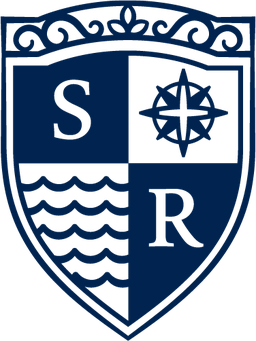Salve Regina Students Through the Decades
Salve Regina University has changed drastically over its 75-year history. Beginning as a very small women’s Catholic undergraduate institution consisting of just one building with Sisters of Mercy teaching most courses, it has transformed into a coeducational university with more than 50 buildings and a mix of Sisters and laypeople teaching hundreds of undergraduate and graduate courses.
To visualize the vast changes that Salve has experienced over the past 75 years, this exhibition will allow visitors to walk through the University's history through the eyes of the thousands of students who have come here to learn over time. Photographs, student handbooks, and other documentary evidence from the University Archives relate their experiences at a changing institution.
Exhibit curated and created by Grace Parenti '22; Genna Duplisea, University Archivist and Special Collections Librarian; and Dawn Emsellem, Director of Library Services; mounted online by Edward Iglesias, Systems and Technology Librarian, and Dawn Emsellem.
Students of Salve Regina: Salve's Beginnings 1947-1961
On September 21, 1947, Salve Regina College opened as a women’s college with 58 students who lived, studied, took classes, and socialized in one building, Ochre Court, which was gifted to the College by the Goelet family. The family also donated Mercy Hall (now the Antone Academic Center) in 1948. In 1955, Florence Twombly Burden donated the Vinland estate (now McAuley Hall), its stables (now Angelus Hall), its gatehouse, and its caretaker’s residence (now Marian Hall).
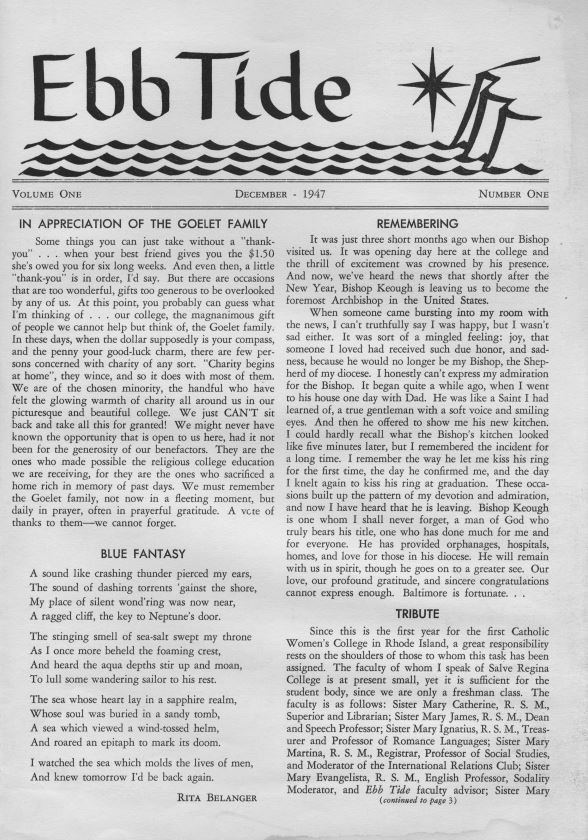
Salve’s student newspaper, Ebb Tide, released its first issue in December 1947. The paper was accepted by the Rhode Island Press Association during the 1948-49 school year and was important to students as one of the main sources of information about campus.
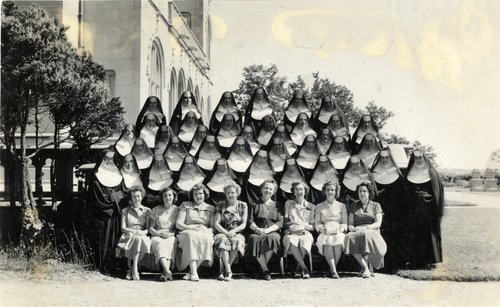
In the early days, members of religious orders, especially Sisters of Mercy, composed the majority of faculty and administrative staff. Students who were also nuns, from a variety of religious orders, attended additional summer sessions after the conclusion of the academic year. Pictured here are the students and Sisters of the 1949 summer session.
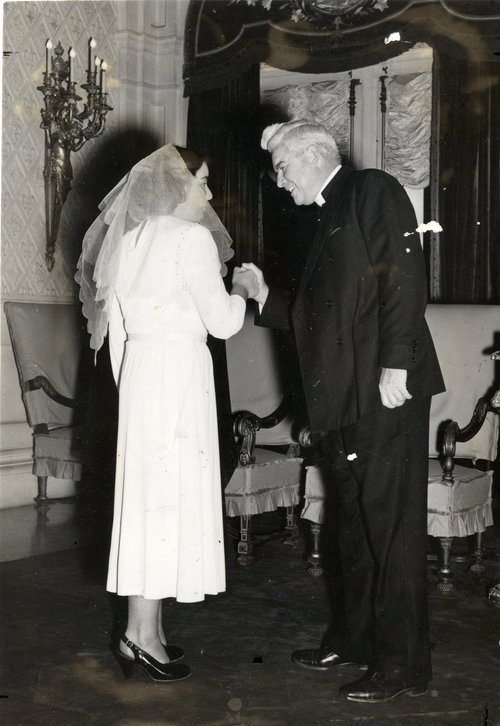
Jane Sullivan ’51 greets Bishop McVinney on Mercy Day, September 24, 1948. Her formal dress reflects the dress codes that played a large role in every-day life during Salve Regina’s early years.
![HandbookForeward[21].jpg](https://exhibit-production-digitalcommons.s3.amazonaws.com/images/HandbookForeward21.width-800.jpg)
The Forward of the first student handbook (1948) states that “to be a Salve Regina girl is an honor and a responsibility.”
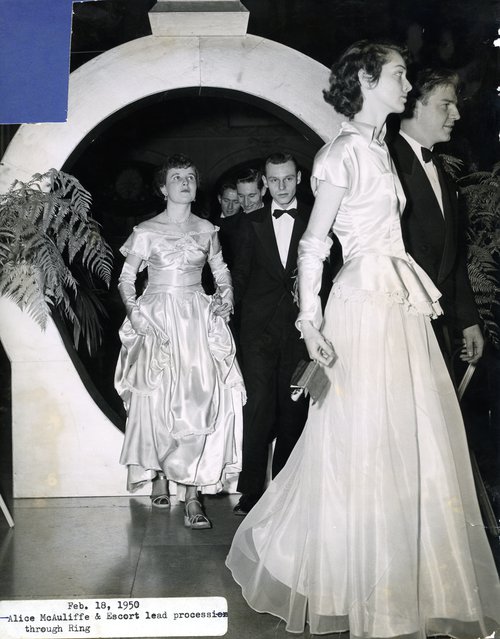
Students received class rings to symbolize their experience at Salve Regina, celebrating the milestone with a Ring Ceremony and Sapphire Ball, which were highlights during their time as students. Pictured here is the 1950 Ring Ceremony and the Sapphire Ball.
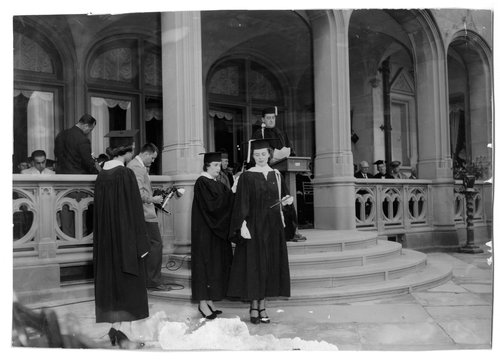
A student receives an honors cord after accepting her diploma during Salve’s first commencement ceremony in 1951.
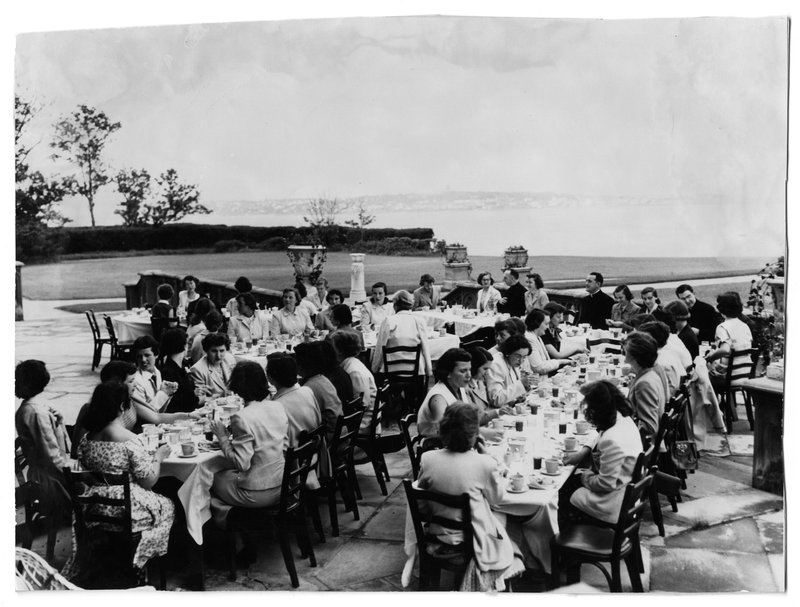
Students and faculty celebrate Class Day at a large outdoor dinner in 1952.
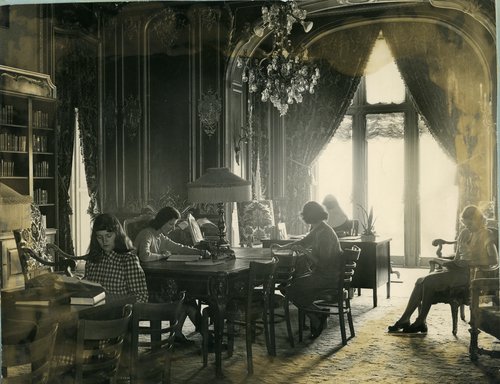
When the college opened, its classrooms, dorms, and the library were all in Ochre Court. The library and study space were in the building's original library room on the first floor before it moved to McAuley Hall in the 1950s.
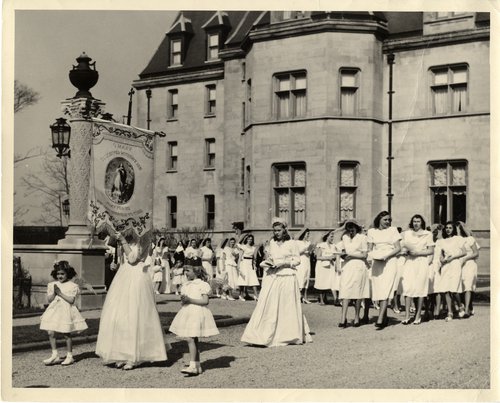
The Catholic liturgical calendar shaped campus life, with students participating in a number of religious traditions, such as the May Queen procession and May Crowning, shown here in front of Ochre Court. In this 1950s photo, a student holds a banner of the Virgin Mary and walks with two children, leading students processing outside Ochre Court. This was likely part of the May Crowning celebration.
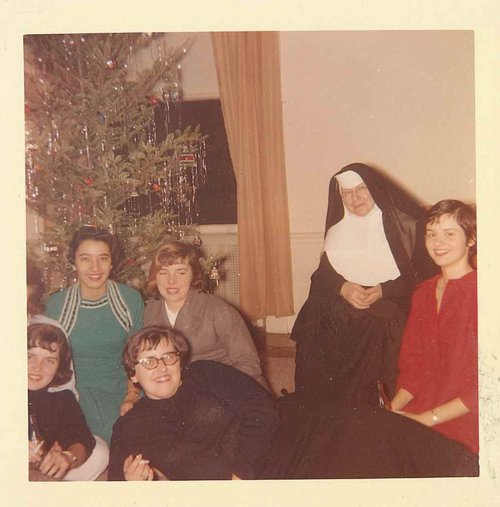
Students enjoy a festive get-together at Christmas time in 1959. Pictured are (clockwise) Deanna Nisbet, Loretta Sheridan, Sister Constance, Monique Geoffrey, Marie Klement, and Gail Fisher.
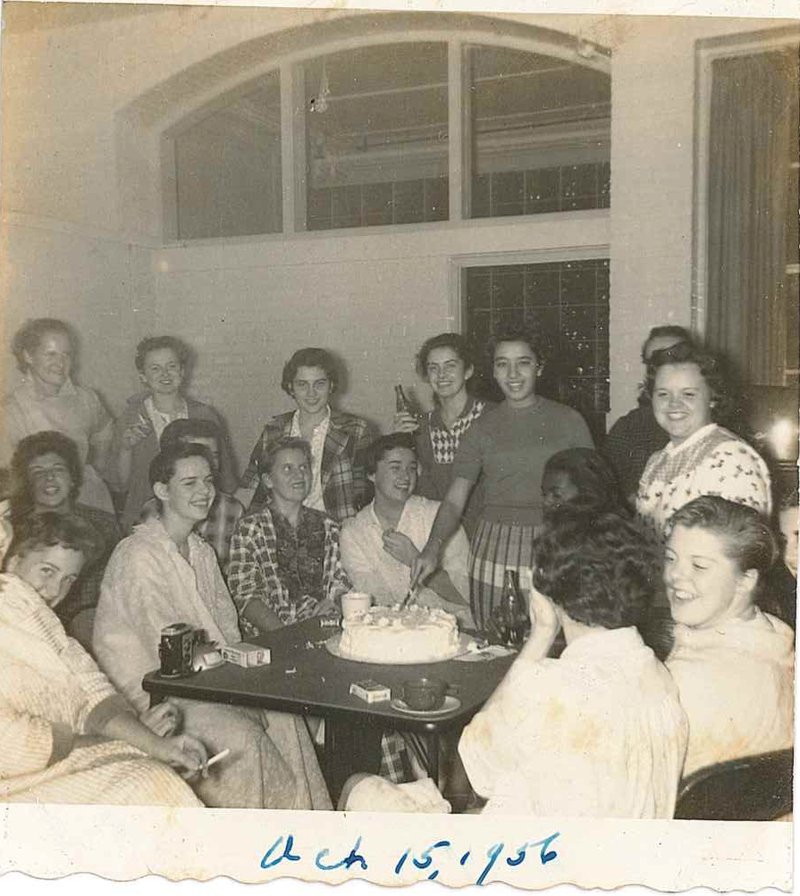
Students celebrate the birthday of Deanna Nisbet '60 in 1956 in the Mercy Hall "smoker room."
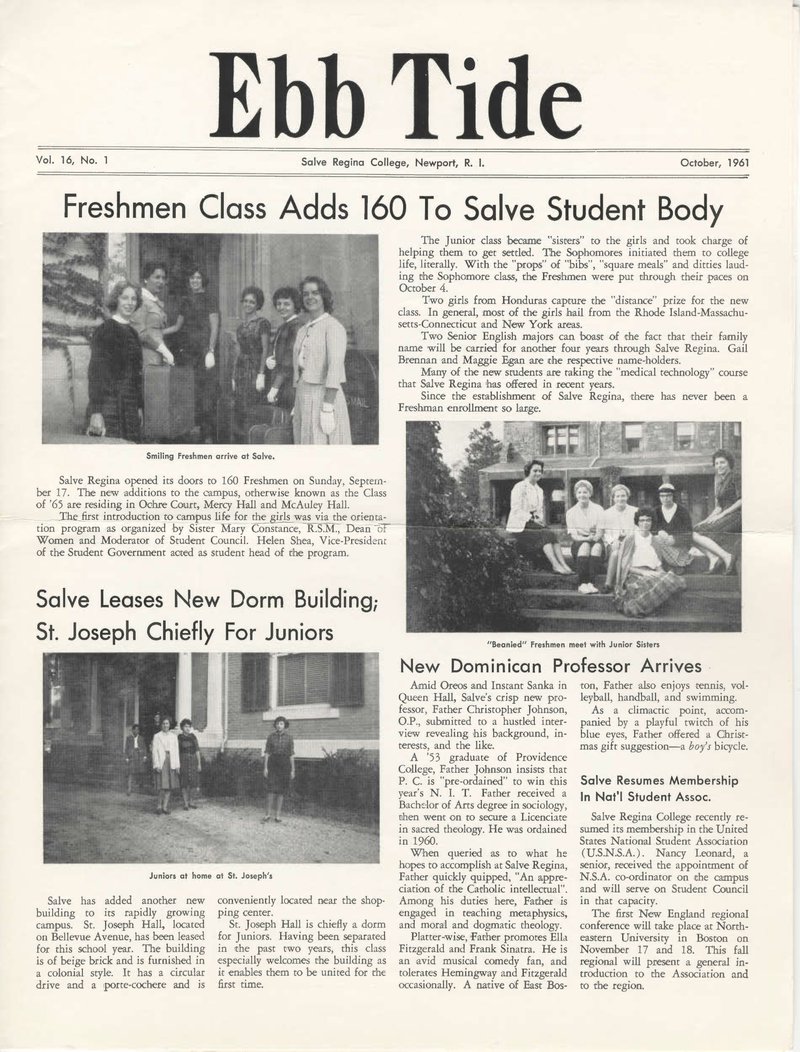
The October 1961 issue of Ebb Tide describes the growth of the College, with student journalists reporting the biggest freshman class to date, the addition of a new junior dorm, and an interview with new professor Father Christopher Johnson.
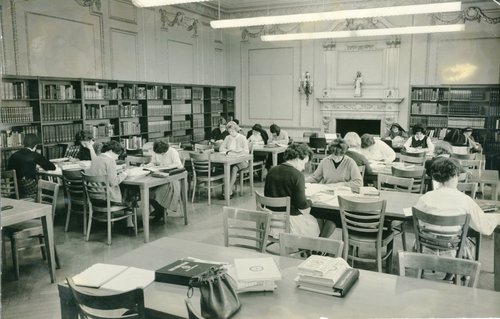
The Salve Regina College library was in McAuley Hall from 1957 to 1991. This photo shows students from the 1950s studying in the reference room.
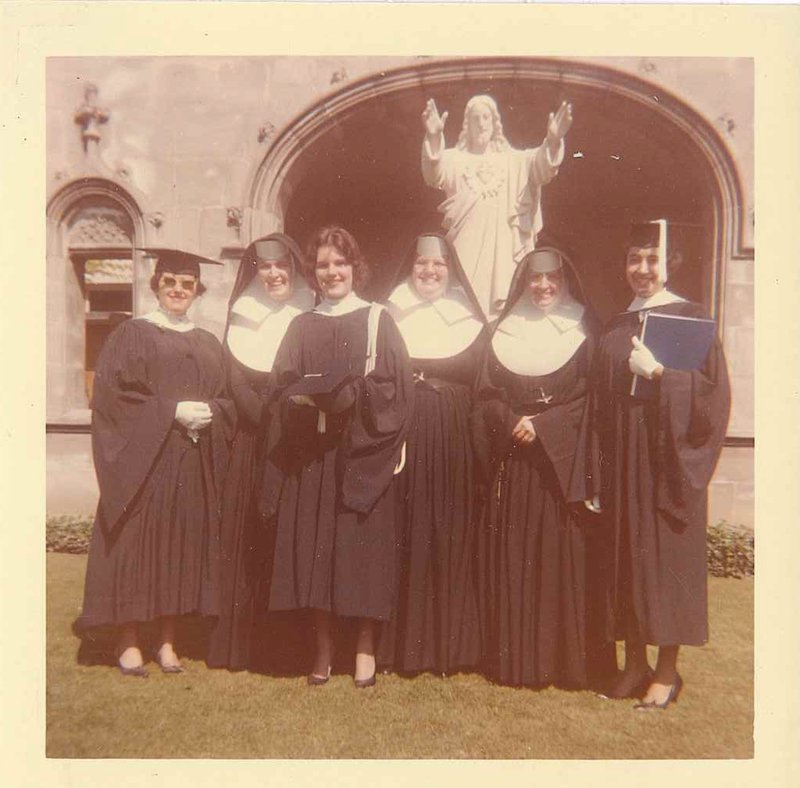
Graduates and sisters pose for a celebratory photo during the 1960 Commencement. Pictured are (left to right) Marie Klement, Sister Rosalia, an unnamed graduate, Sister Christopher, Sister John Francis, and Deanna Nisbet.
<iframe src="https://archive.storycorps.org/embed/3584987/" width="720" height="427" frameborder="0" scrolling="no"></iframe>
Students of Salve Regina: Student Activism 1962-1976
In their chronicle of the College’s history, With Courage and Compassion, twin Sisters Mary Eloise Tobin and Mary Jean Tobin reflect on the tenure of Mother Mary Hilda Miley:
"In July 1964, Mother Hilda retired as President of the College, a post she had held for sixteen years. In those years she saw the College grow from fifty students to almost six hundred, from one building to twelve buildings."
The early 1960s saw dramatic growth of enrollment, campus buildings, and academic offerings. A significant milestone in this growth was the opening of O’Hare Academic Center in January 1968. Also, a rise in student activism and protests in the late 1960s and 1970s at Salve Regina reflected the wave of events taking place throughout the country. At Salve Regina, this represented a drastic cultural shift. Shifts in tone and content in student reporting in Ebb Tide reflect this shift, as does the documentary record of photographs, letters, and other materials.
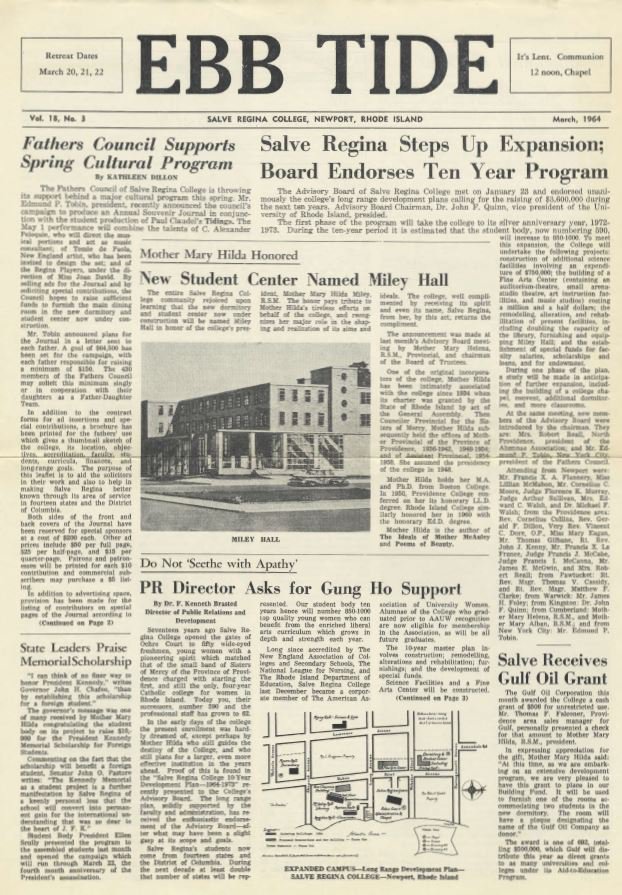
Ebb Tide reported on the opening of Miley Hall in March 1964.
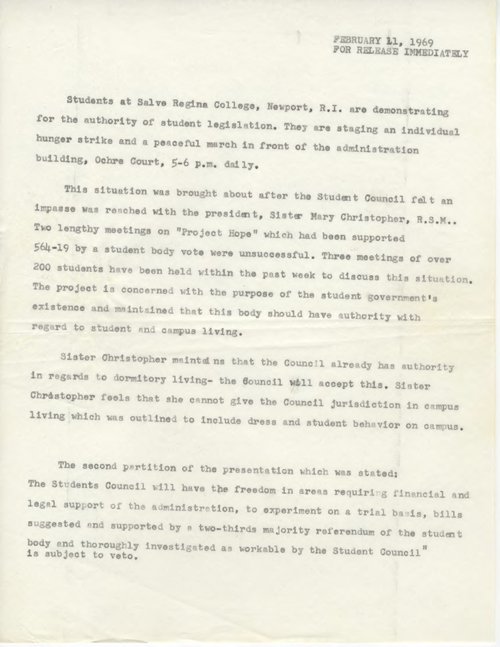
On February 11, 1969, Salve’s Student Congress issued this press release announcing that students would be participating in a daily protest and hunger strike.
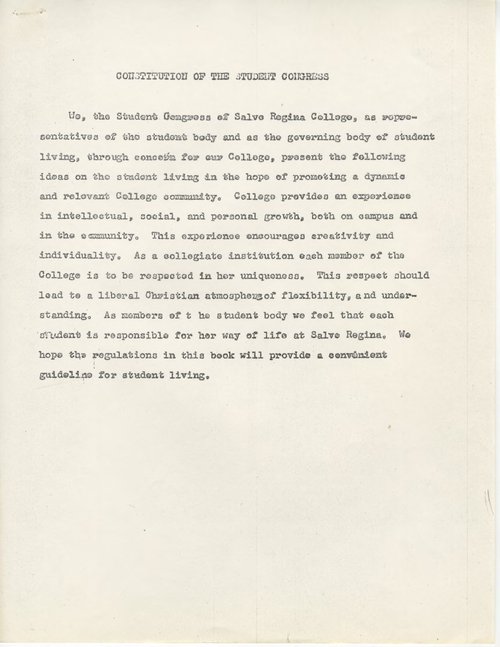
Salve’s Student Congress drafted and approved a constitution which over 12 pages described the students’ conception of the role of the Student Congress membership and committees and outlined a form of direct voting by the student body.
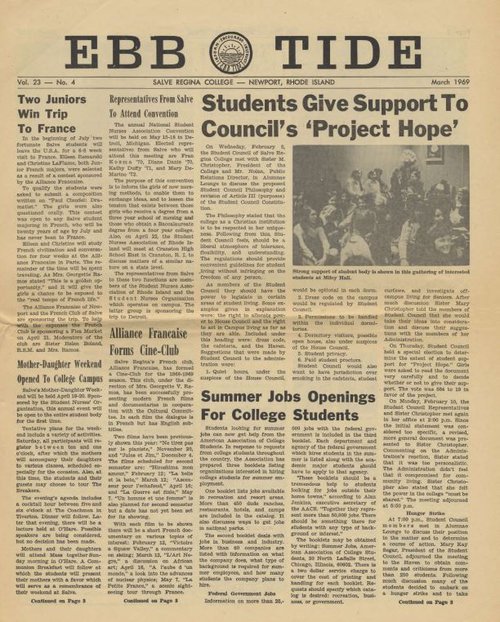
In March 1969, Ebb Tide reported that the Student Congress had released a “Student Council Philosophy and revision of Article III (purposes) of the Student Council Constitution.” The Student Council requested more of what were referred to as "parietal rights," such as control over the campus dress code and rules for dorm living. According to the article, in a vote the student body approved the documents by a margin of 564-19. The paper reported that students were unsatisfied with the response of President Christopher, and began a hunger strike, noting “Only a fraction of the resident students ate in the cafeteria.”
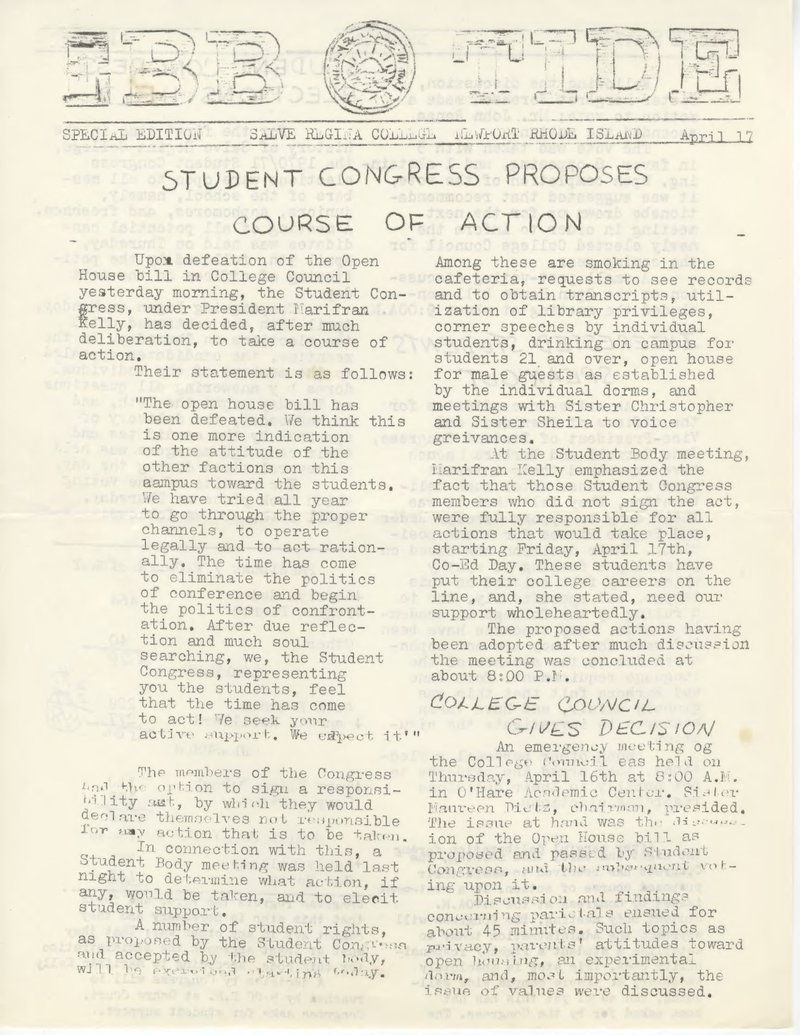
As reported in an April 17, 1970, special issue of Ebb Tide, the Student Congress demanded rights such as
“smoking in the cafeteria, requests to see records and to obtain transcripts, utilization of library privileges, corner speeches by individual students, drinking on campus for students 21 and over, open house for male guests as established by individual dorms and meetings with [President] Sister Christopher and [Dean of Women] Sister Sheila to voice grievances.”
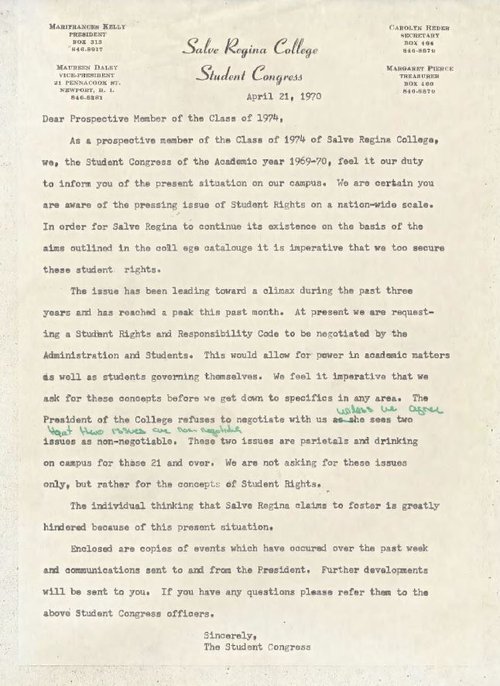
Salve Regina’s Student Congress composed this letter for distribution to prospective students to inform them of the ongoing fight for student rights on campus.
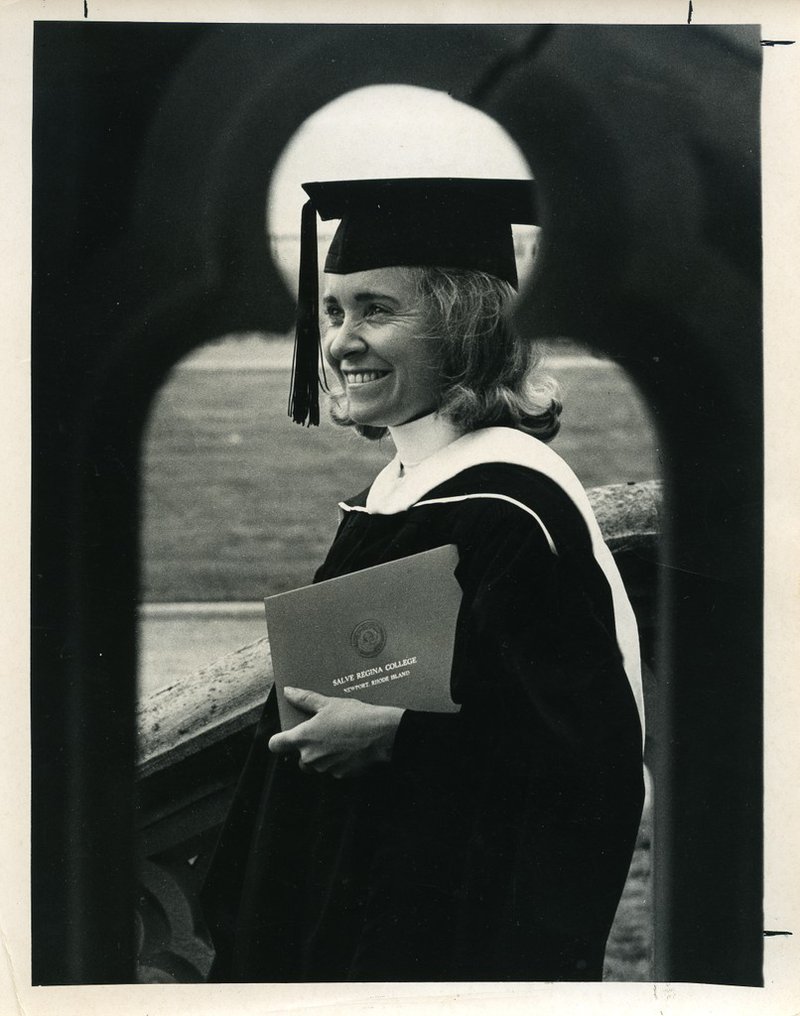
Kathleen Joyce McArdle '70 poses for a photo after receiving her diploma.
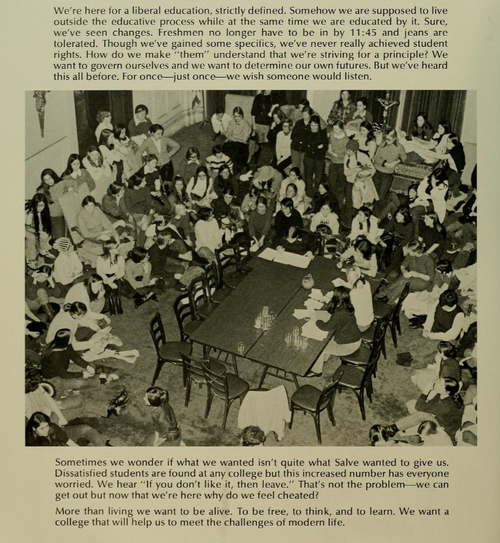
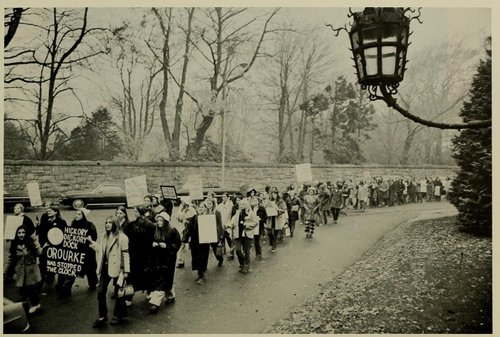
The 1971 yearbook, Regina Maris, reflected the political tumult of the time, with yearbook editors placing this two-page spread in the first pages.
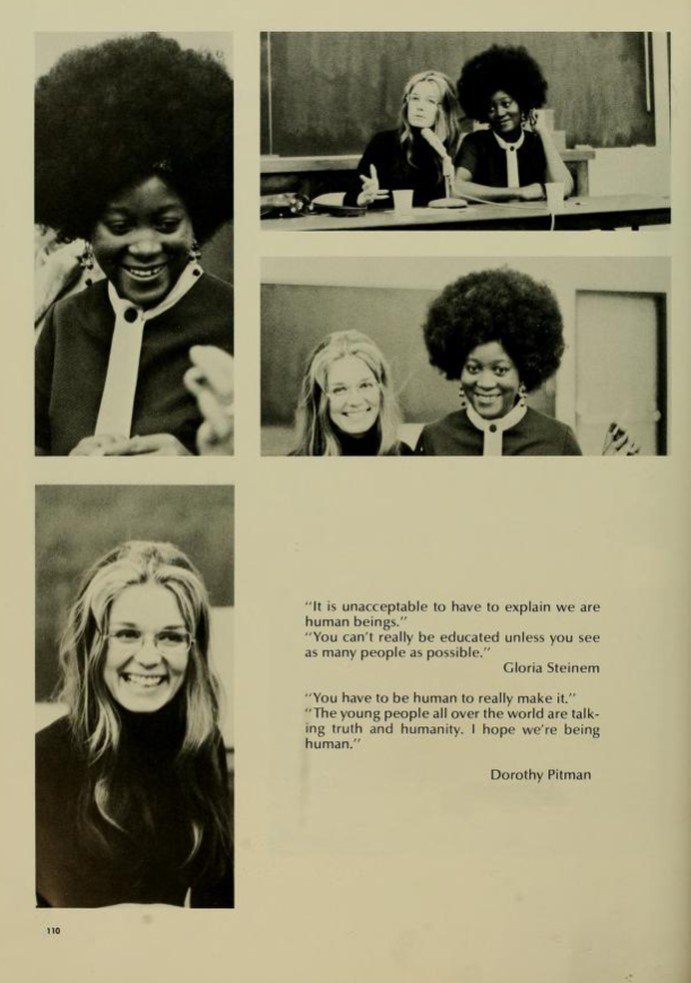
Student interest in the women’s liberation movement is reflected in the 1971 issue of yearbook Regina Maris commemorating a visit by feminist icon Gloria Steinem and feminist and racial justice activist Dorothy Pitman Hughes.
While Salve Regina had offered adult education courses to men since 1948, in 1971 the College decided to offer a bachelor’s degree in all majors except nursing to non-resident women and men. Despite this, the Tobin sisters note in their chronicle of Salve Regina’s history that “Sister Mary Christopher strongly reaffirmed the College as ‘a women's Christian liberal arts college.’”
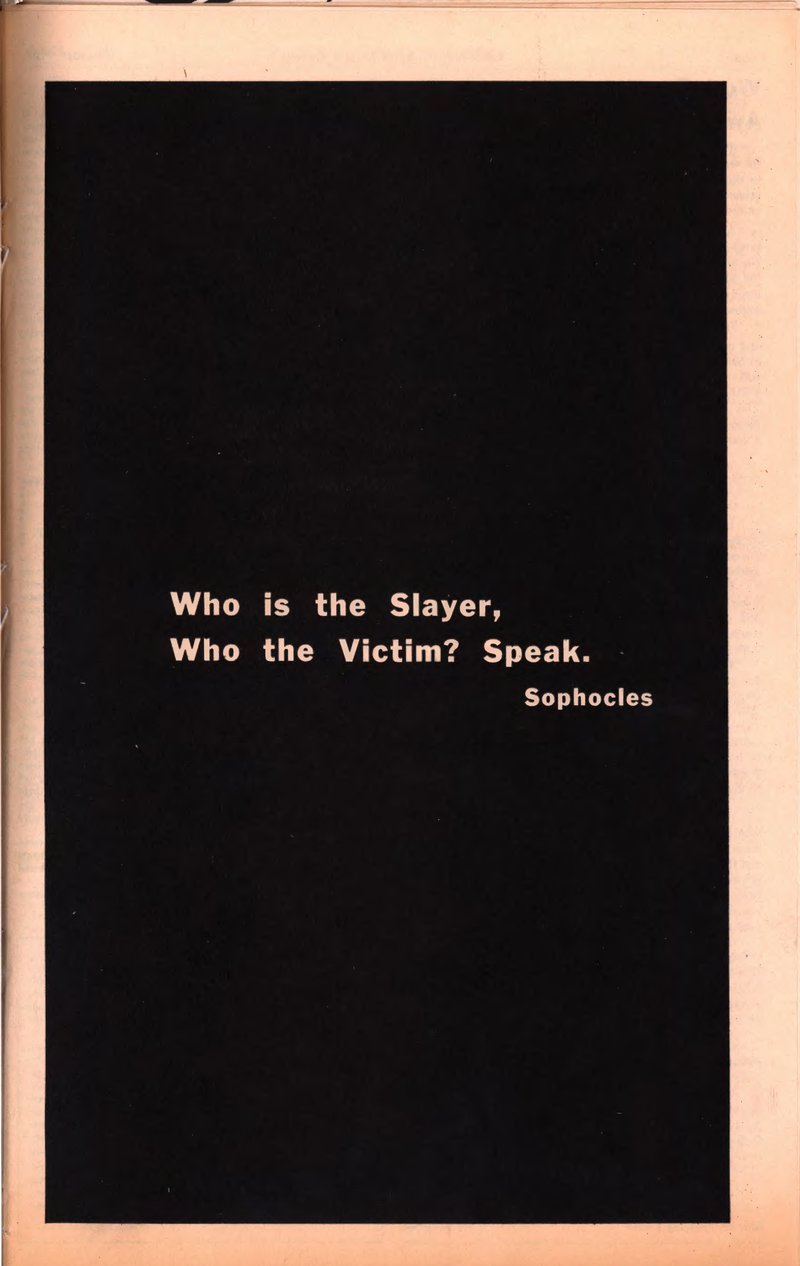
The October 1969 Issue of Ebb Tide quoted Sophocles in this dramatic full-page statement against the Vietnam War.
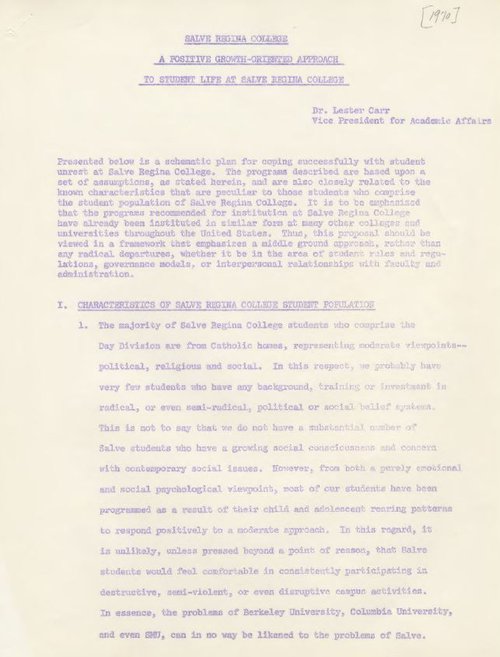
A document created by Lester Carr, Vice President for Academic Affairs, recommending changes such as opportunities for off-campus living, expanded opportunities for student governance of dorms, and student participation in most campus committees.
According to the Tobin sisters’ account,
“By February 1971 a compromise on the Bill of Rights was reached. However, the issue of student autonomy regarding student living was referred to a committee of students and administrators for refinement.
The formal resolution of what came to be known as the Dorm Autonomy Bill was made by the Board of Trustees on November 20, 1971. The primary reason for this decision was that the State laws had been changed to recognize eighteen-year-olds as adults.
Thus, students were allowed to govern their dormitory life for a four-month trial period. Students would be allowed to entertain men in their rooms from noon until midnight on weekdays and from noon until 2 a.m. on Saturdays and Sundays."
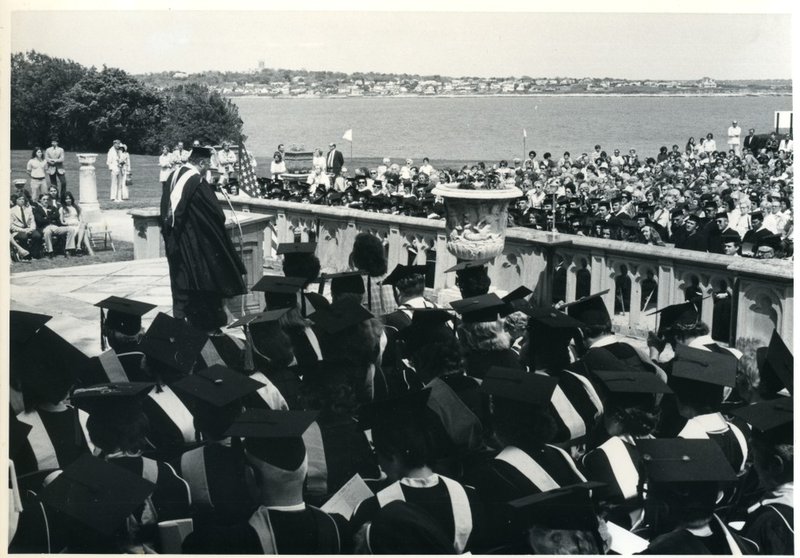
Students and guests on the Ochre Court patio and lawn 1975 Commencement ceremony.
Students of Salve Regina: Women & Men of Salve 1977-1990
The 1980s saw continued growth with the construction of the Watts-Sherman addition which housed eighty students, and Hunt-Reefe, which housed 146. The Tobin sisters also describe growth in Salve Regina's undergraduate curriculum with expansion of offerings in art, theater, and dance as well as management, and refinement of nursing and education programs and facilities.
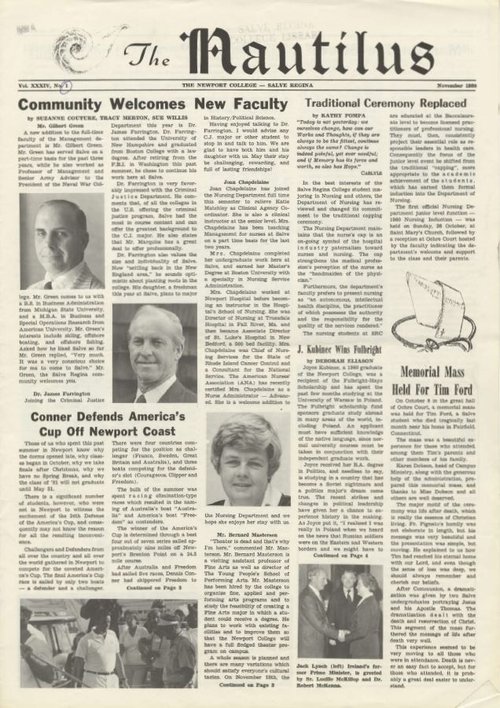
This November 1980 issue of the student newspaper The Nautilus reports on the discontinuance of the traditional capping ceremony, noting, "The Nursing Department maintains that the nurse's cap is an on-going symbol of the hospital industry paternalism toward nurses and nursing. The cap strengthens the medical profession's perception of the nurse as the 'handmaiden of the physician.'"
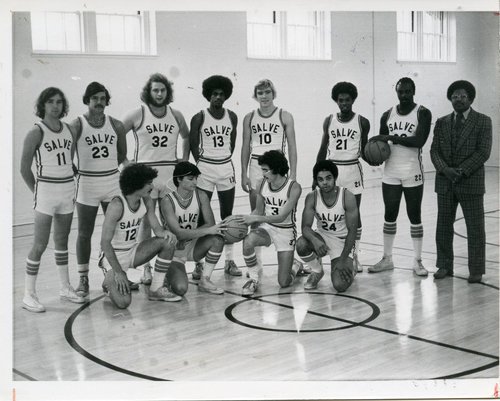
The 1977 Salve Regina Basketball Team.
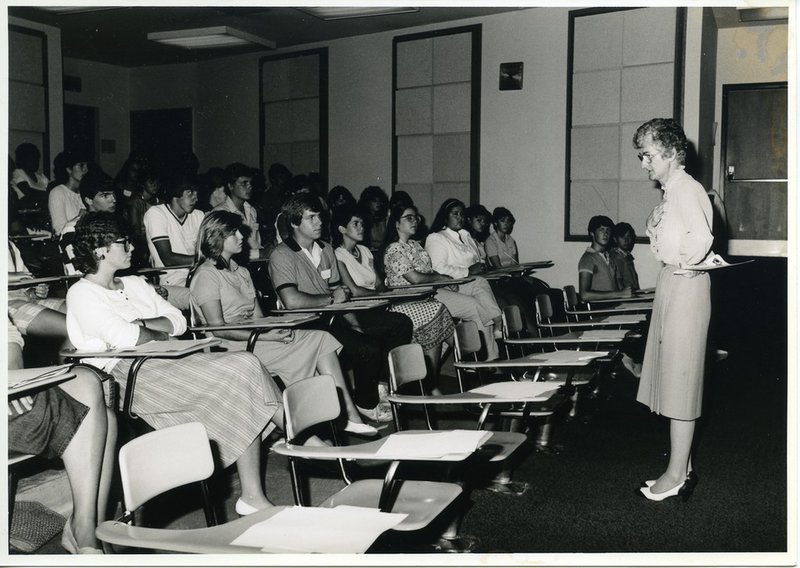
Sister Sheila Megley addresses students in class in this photo dated 1982-84.
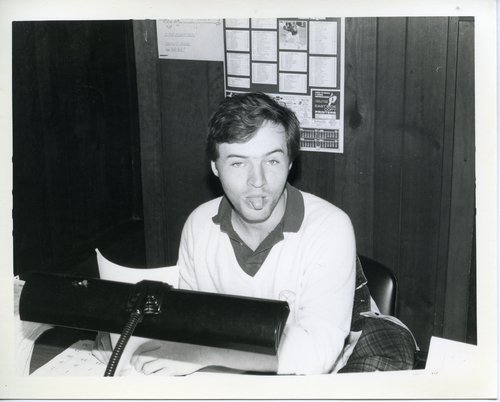
A student reacts playfully to a photographer while at work or study. A floor plan behind him reads “faculty house.” This photo is dated from the early 1980s.
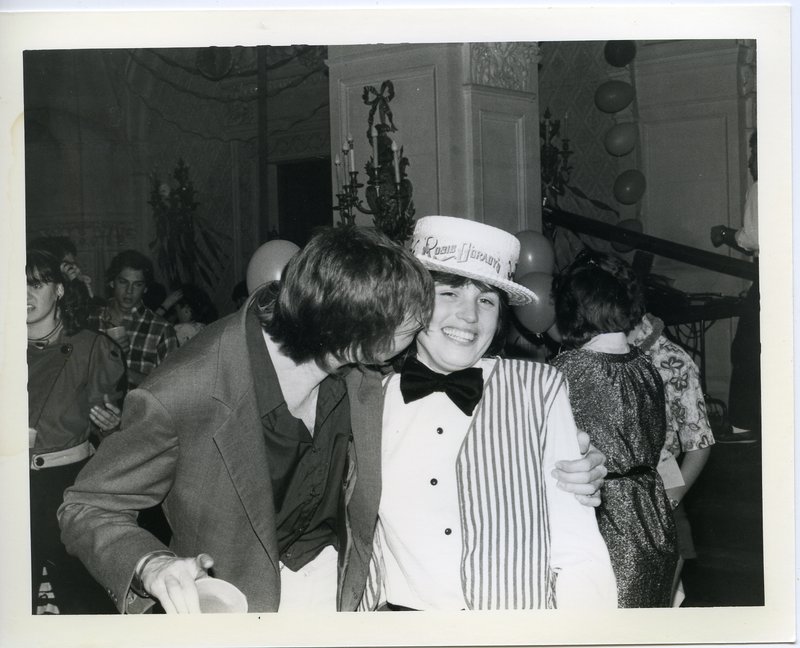
A photographer captures a moment between two students at a 1982 dance in Ochre Court.
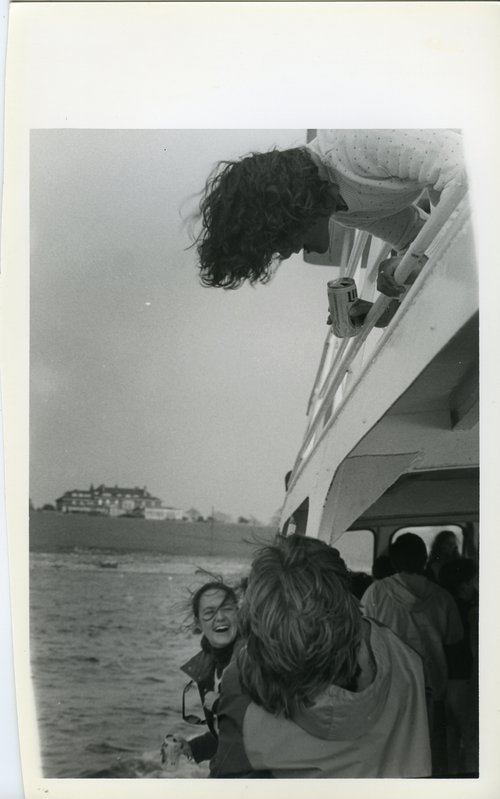
Students visit over the railings of a boat ride in the early 1980s.
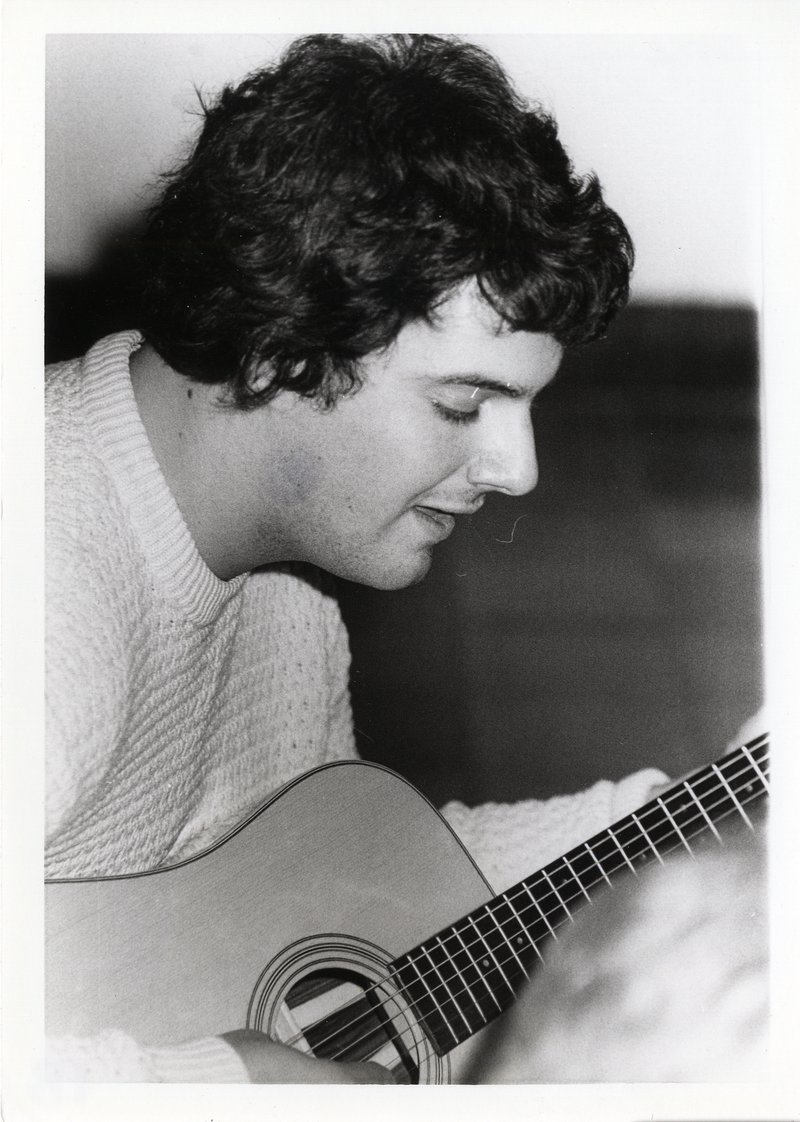
A student plays guitar and sings at a Campus Ministry event, ca. late 1970s to early 1980s.
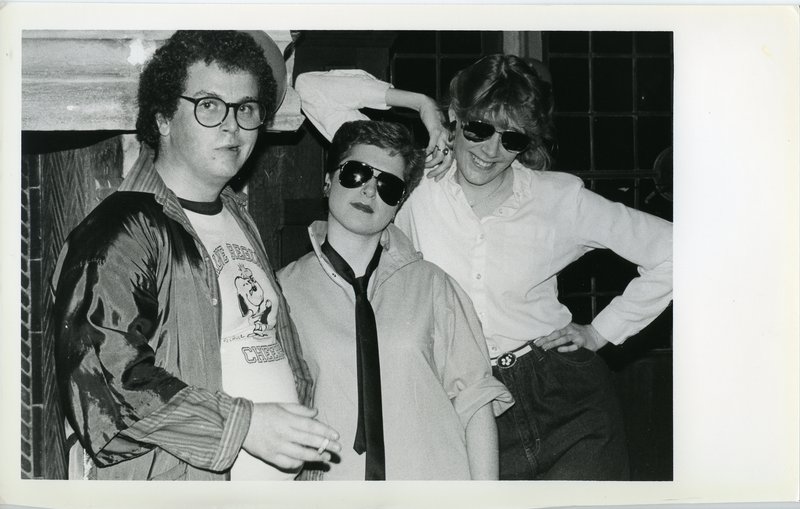
Three students channel Risky Business, 1980s style.
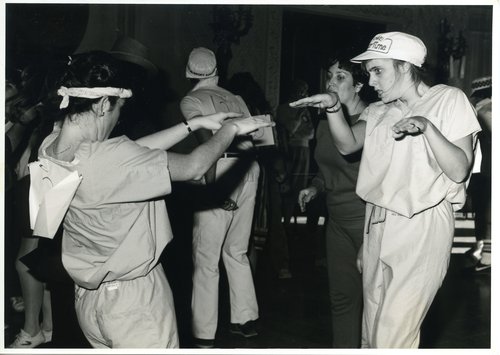
Students in hospital scrubs compete in a dance contest in the early 1980s.
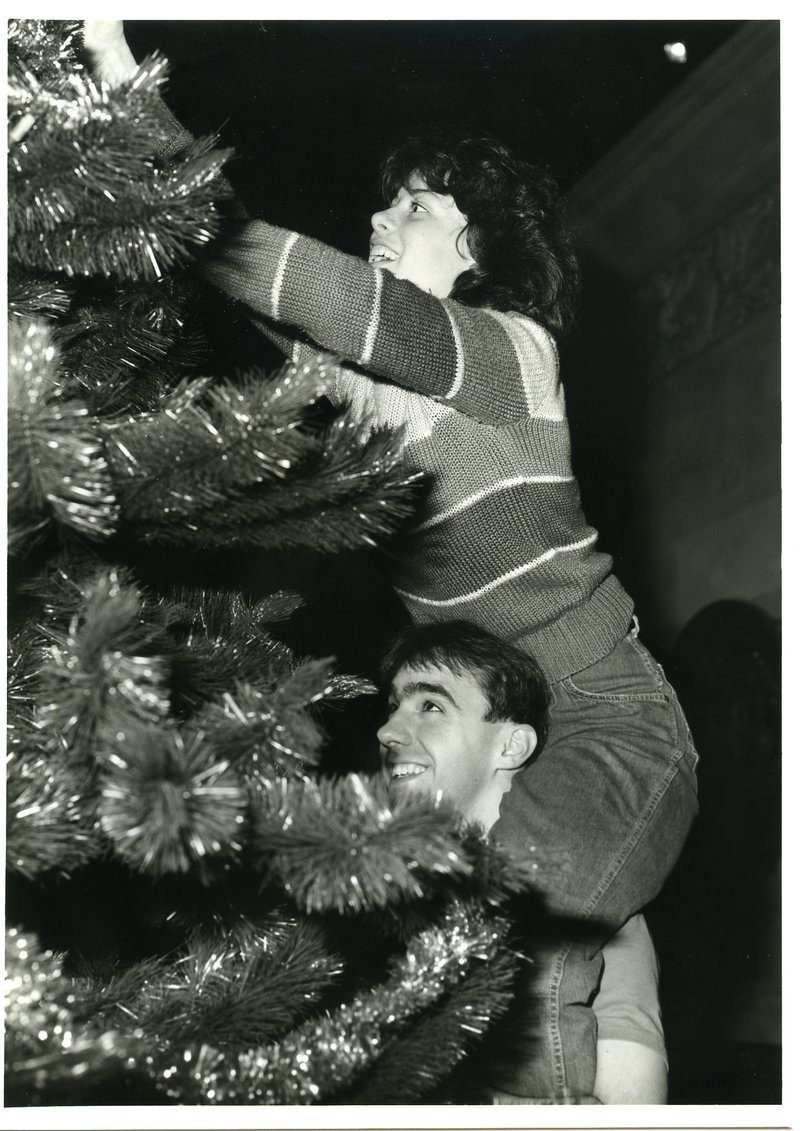
One student helps another reach the top of a Christmas tree in the early 1980s.
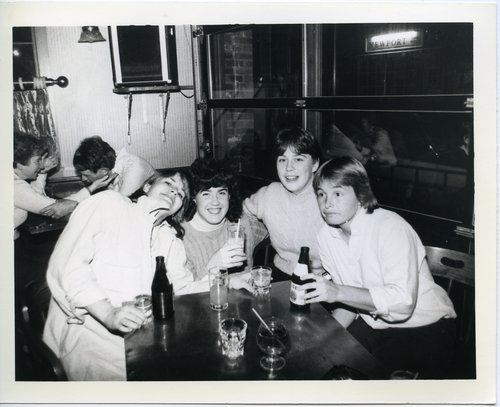
Four students, identified as Julie, Suzanne, Ellie, and Kathy, celebrate at the "100 Days Party" during the end of their senior year in the early 1980s.
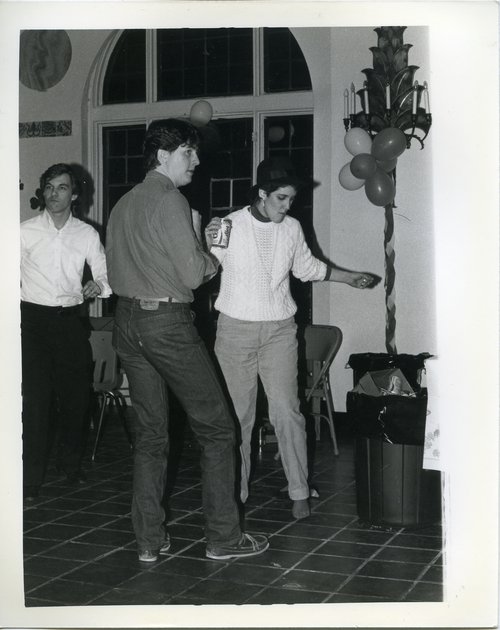
Students dance at an early 1980s St. Patrick’s Day party.
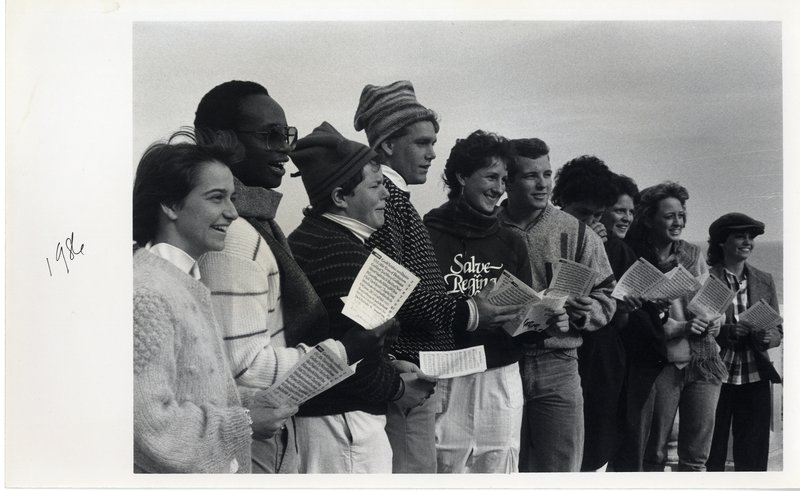
Students participate in a sunrise service on a chilly morning in 1986.
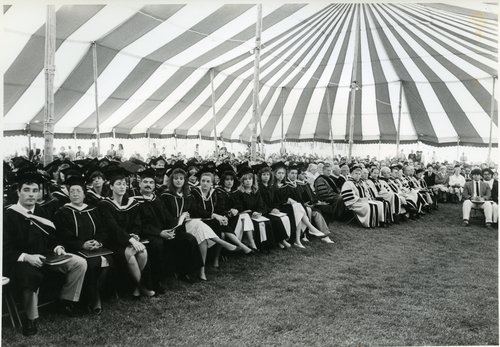
The Class of 1988 during Commencement.
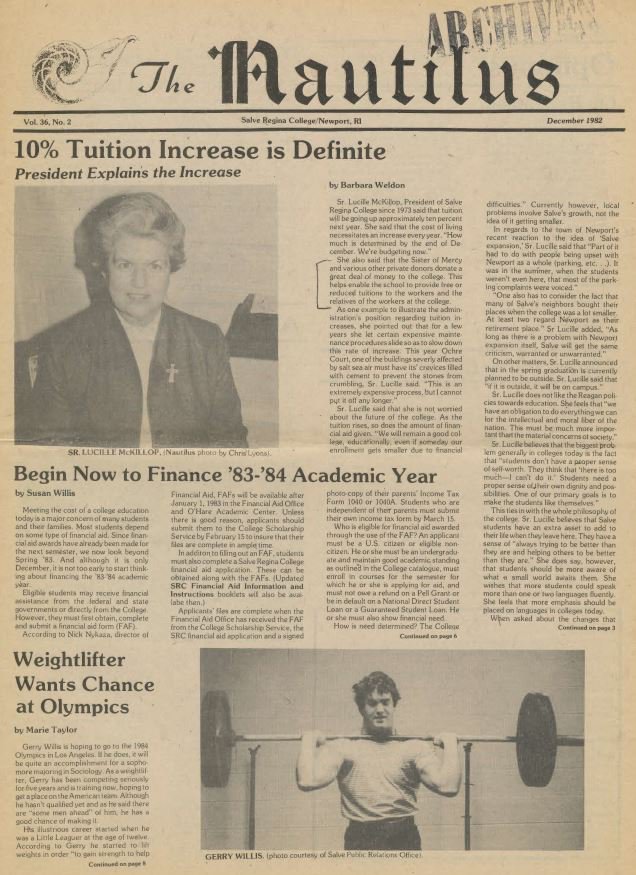
This December 1982 issue of The Nautilus quotes president Sister Lucille McKillop's explanation of the reasoning behind a 10% tuition increase and profiles student athlete Gerry Willis '86, who retired in 2022 after serving as director of alumni/parent programs.
Oral history of the Parenti family (class of 1987, 1988, and 2022)
<iframe src="https://archive.storycorps.org/embed/3593594/" width="720" height="427" frameborder="0" scrolling="no"></iframe>
Students of Salve Regina: University Status 1991-2006
In April 1991, Salve Regina’s name changed from Salve Regina College to Salve Regina University. This new designation reflected the maturation of Salve Regina’s undergraduate programs as well as the growth of Salve Regina’s graduate offerings. The Tobin sisters note:
In a special news release to the college community on April 9, 1991, Sister Lucille [McKillop, university president]made the following statement:
This change in status represents the normal evolution of a progressive institution. The university title builds on the traditional strength of our undergraduate college and the intensive scholarly emphasis will continue to enhance our basic studies. This name modification is a formal recognition of the impact of graduate education on Salve Regina. We have, in a reality, been a university for some time.
The Tobin sisters chronicle the development of the academic program at Salve Regina. They write that the college began planning for graduate education in 1969, with the first Master of Arts degree offered in 1974 in the area of human development. The Master of Science program in criminal justice was offered in 1977. By 1993, the University offered specializations in gerontology, holistic counseling, human development, and organization management, liberal studies, international relations, financial management, health services administration, and information systems science.
Today, Salve Regina offers 13 master’s programs with many more specializations and certificate offerings and three doctoral programs: the humanities and international relations, and a Doctor of Nursing Practice.
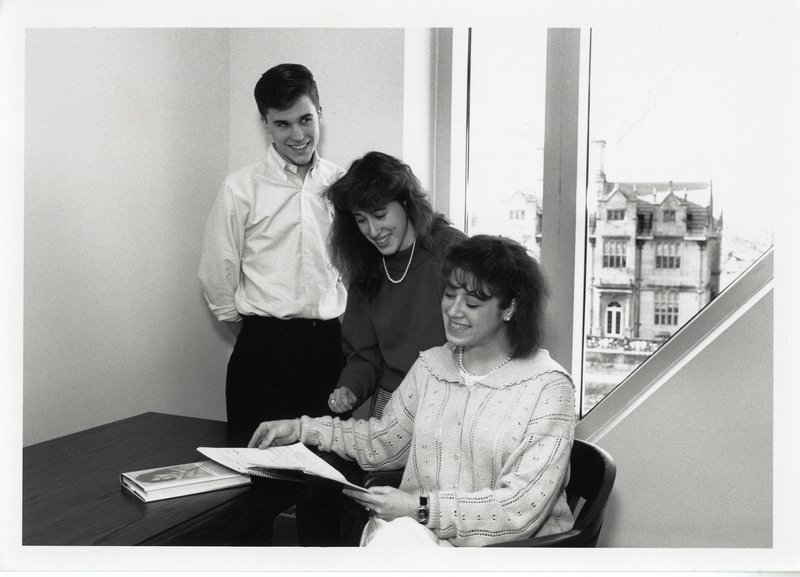
In accordance with Salve Regina’s growth, efforts to build its academic programs and in response to accreditors’ recommendations to build collections in support of the curriculum, the 70,000 square foot, $8,000,000 McKillop Library opened on March 1, 1991. Three students study on the library’s third floor, with Gerety Hall in the background.
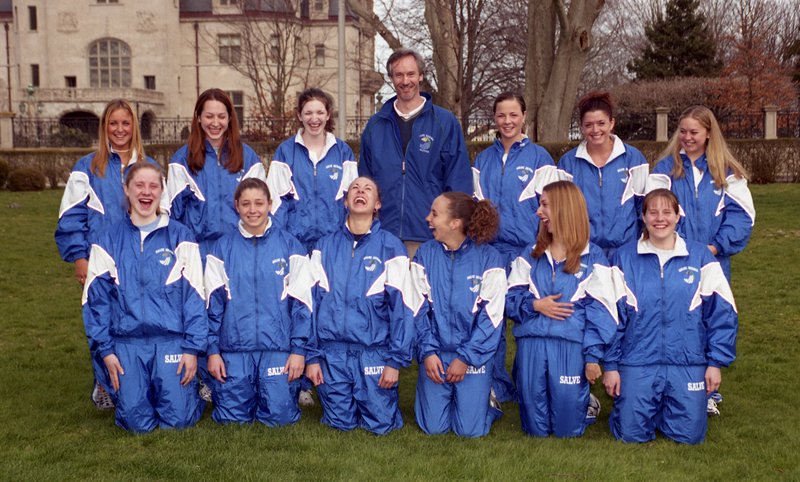
The women’s track and field team laugh while their official photo is taken in 2002.
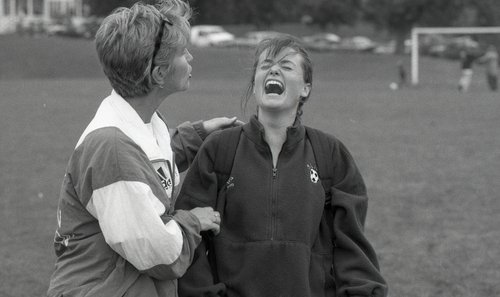
A soccer player shares a laugh with her coach in 1996.
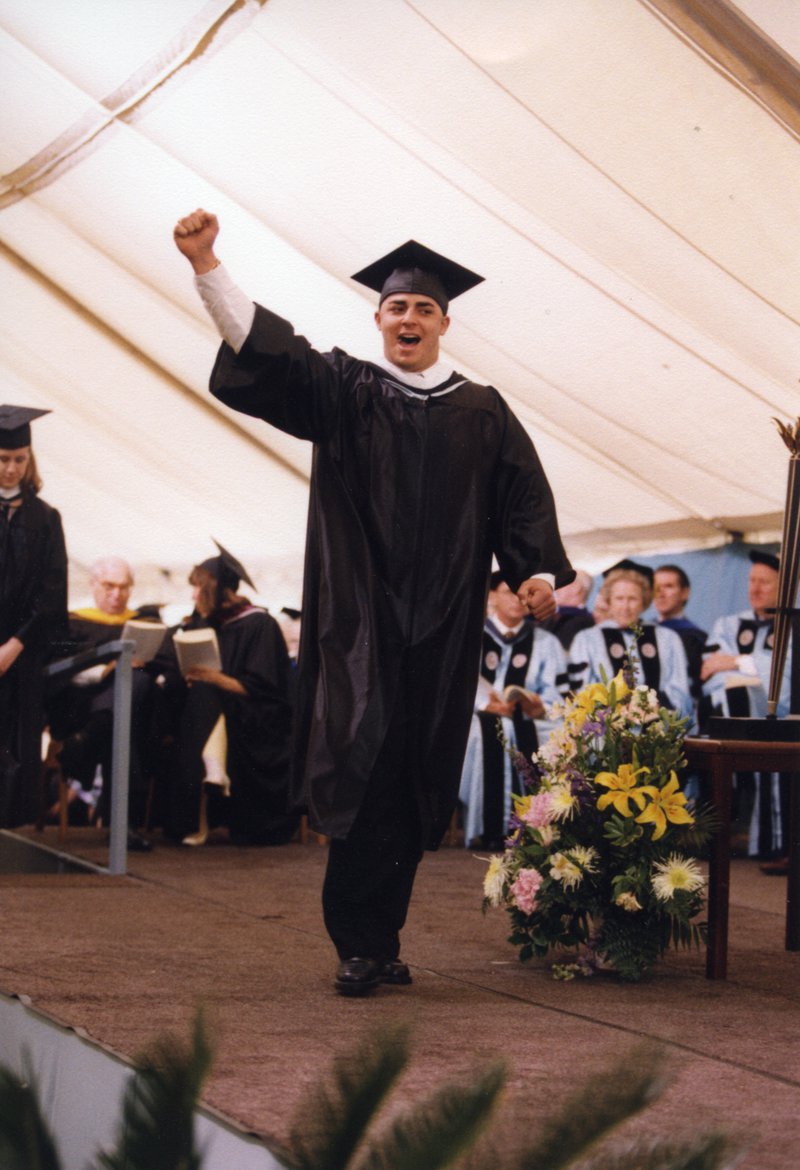
A graduating student expresses triumph while crossing the stage to receive his diploma.
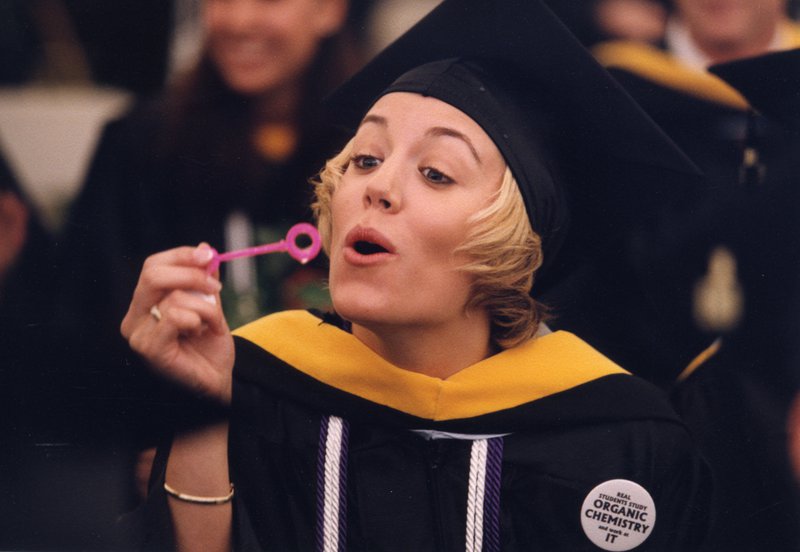
AnnMarie Green ’98 blows bubbles during her undergraduate commencement ceremony.
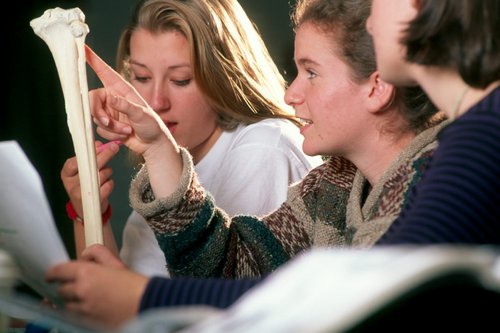
Students get familiar with the human skeleton in a 2001 anatomy class.
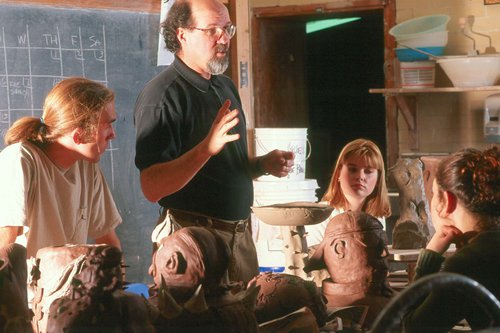
Students listen as a professor gives guidance in a 2002 ceramics class.
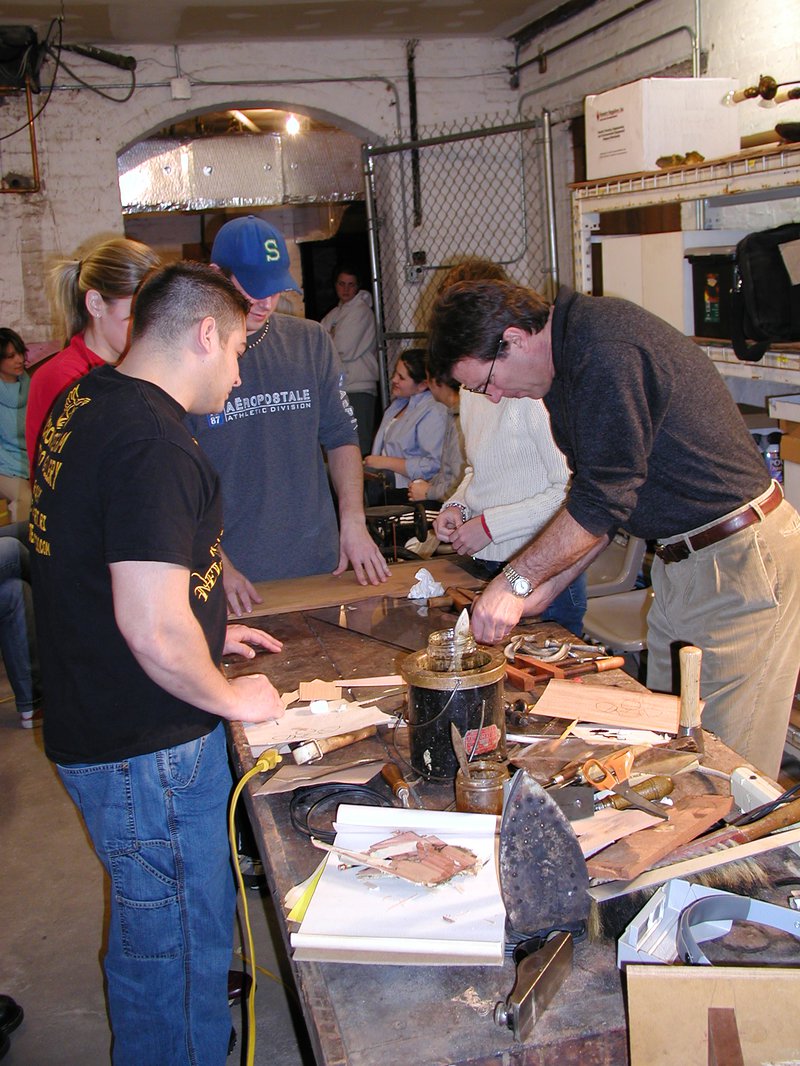
Students receive instruction on marquetry during a 2004 workshop in the McAuley basement cultural and historic preservation lab.
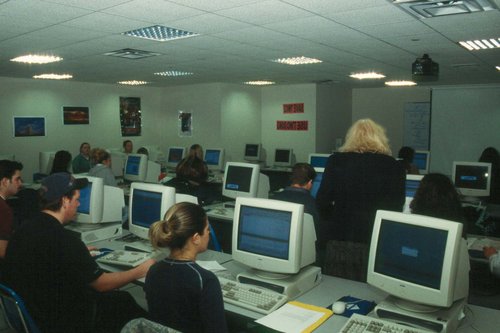
A professor helps students in computer lab during a 2002 class.
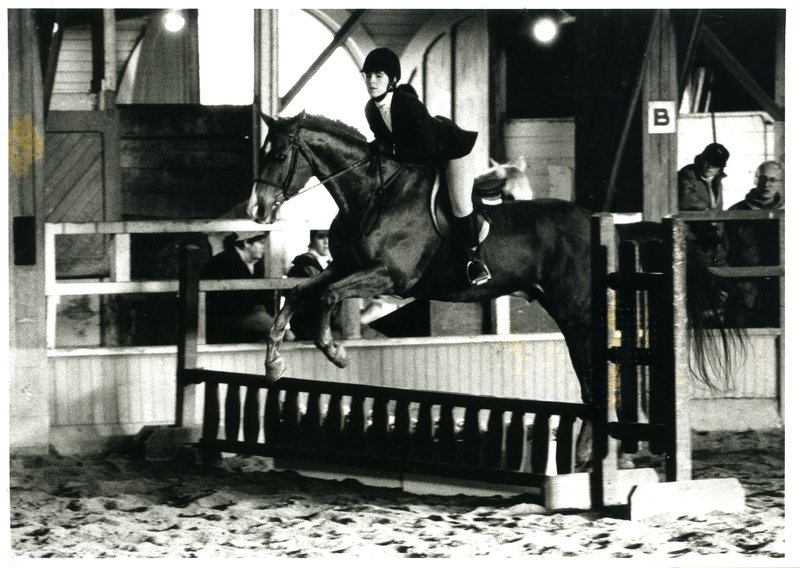
An equestrian club member performs a jump in 2002.
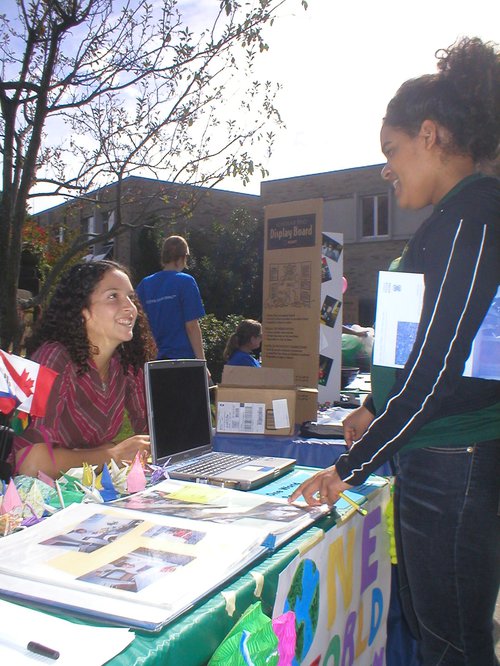
A student receives information about student clubs during 2004 Club Rush.
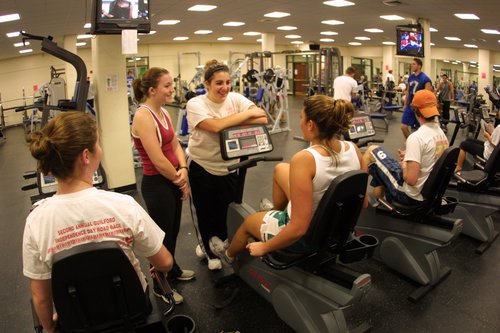
Students visit while working out in this 2004 photo of the Rodgers Recreation fitness center.
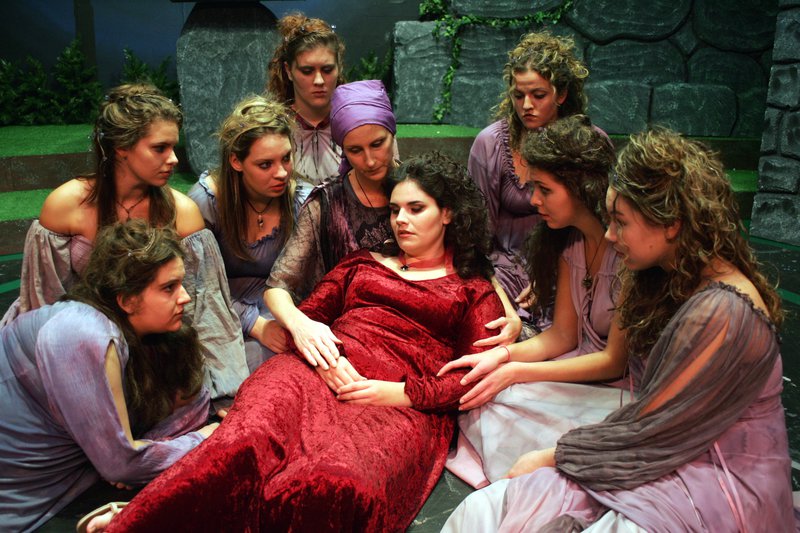
The cast surrounds lead actor Mary Beth Luzitano ’06 in this 2004 photo of Salve Regina’s production of Medea.
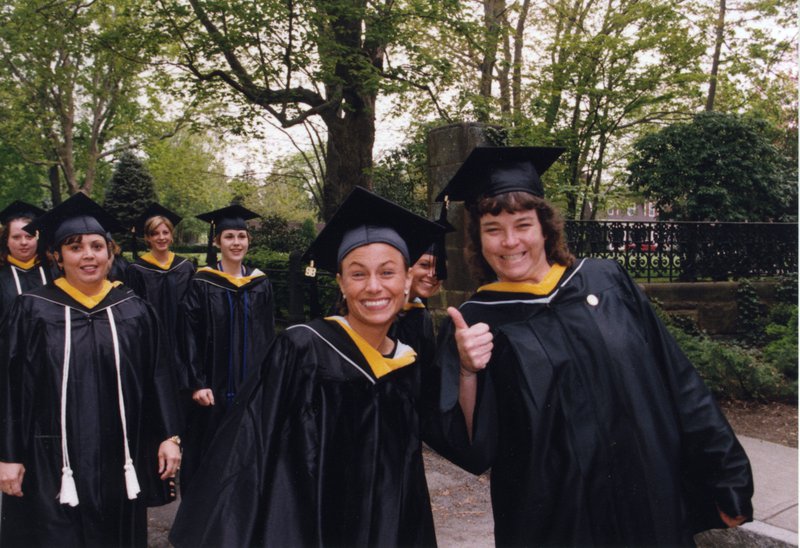
Graduating students give a photographer a thumbs-up in 1998.
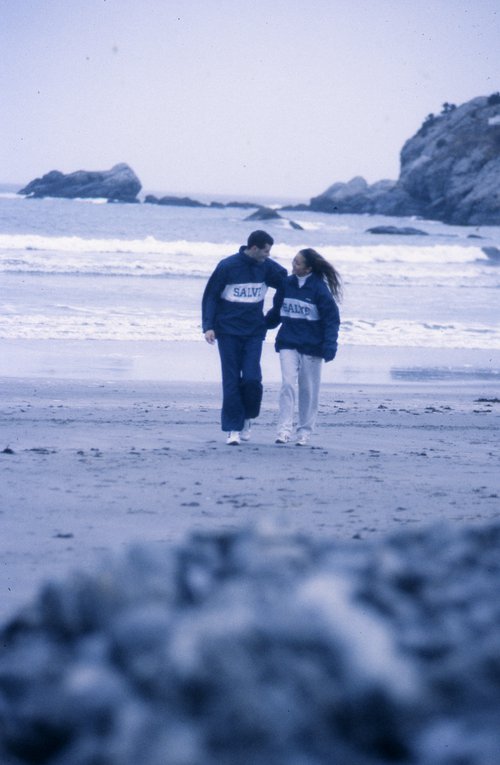
Student-athletes walk together on the beach during a 1996 track and field practice.
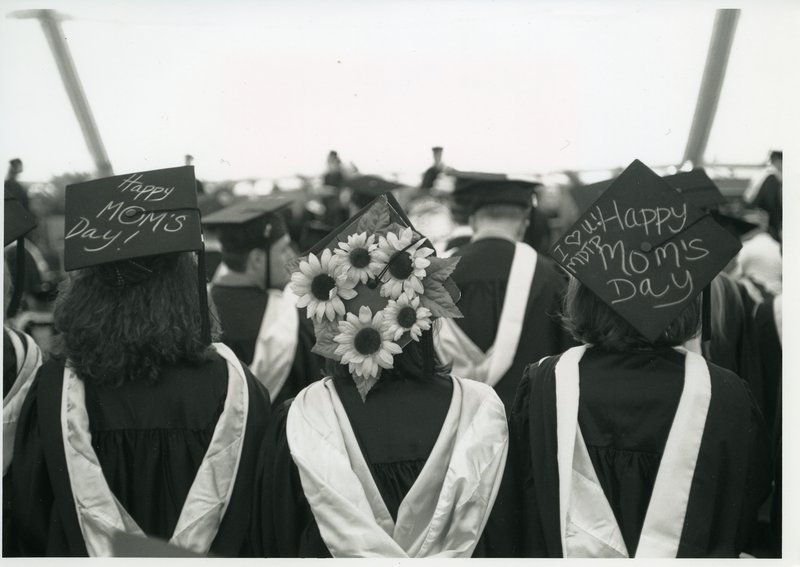
Students celebrate their mothers at their graduation in 1995.
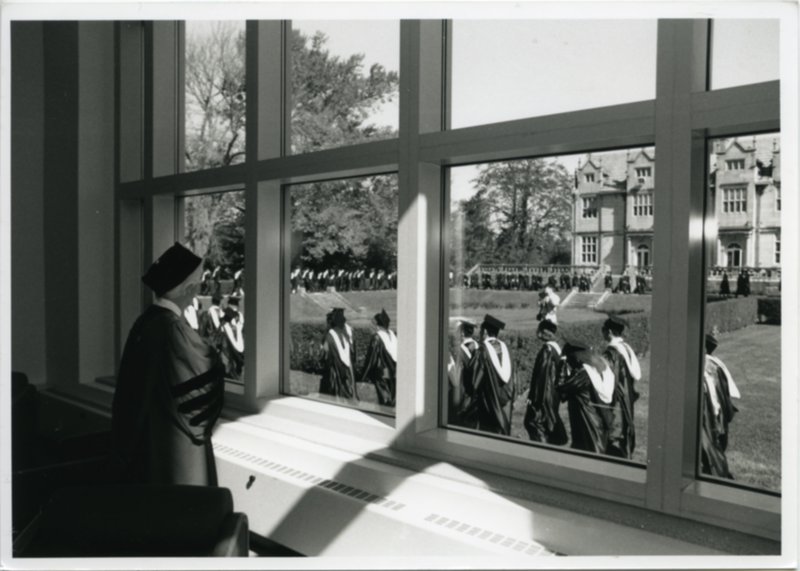
Sister Therese Antone looks out from within McKillop Library as graduate students walk to the commencement tent in 1997.
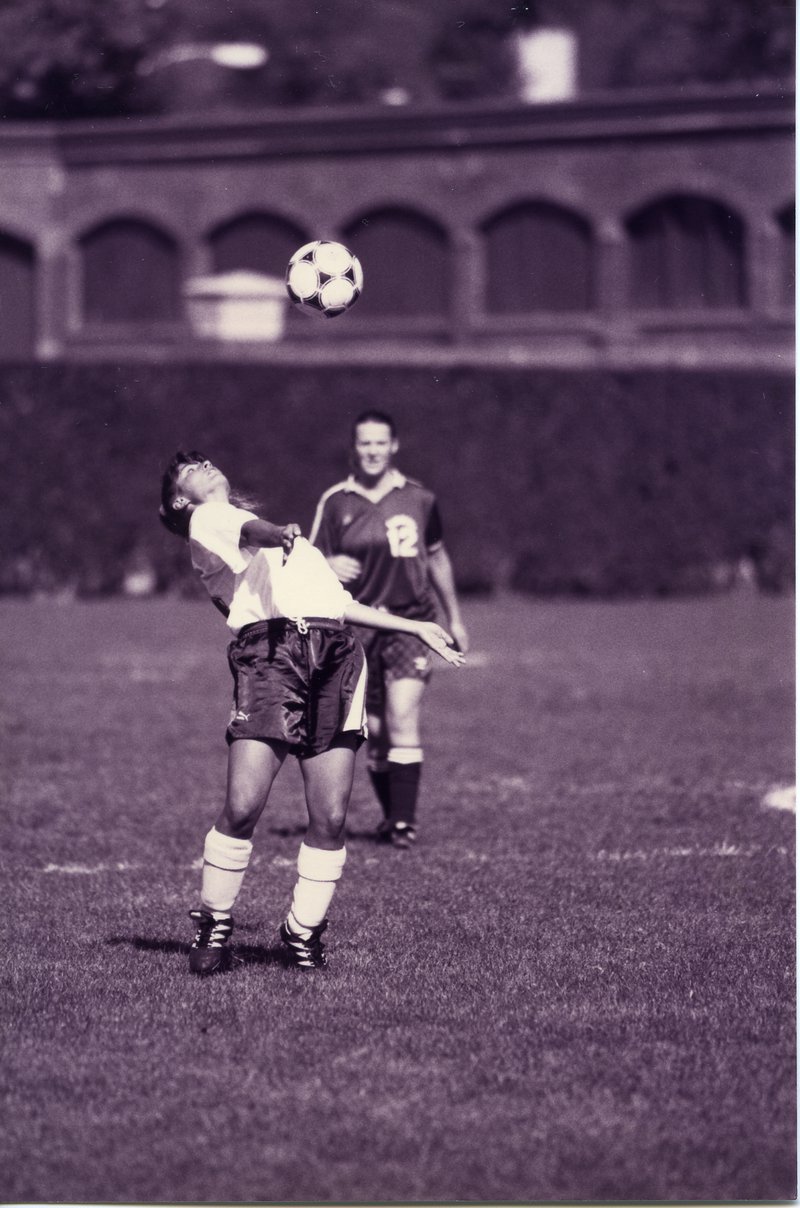
A women’s soccer player positions herself to hit the ball with her body during a game in the 1990s.
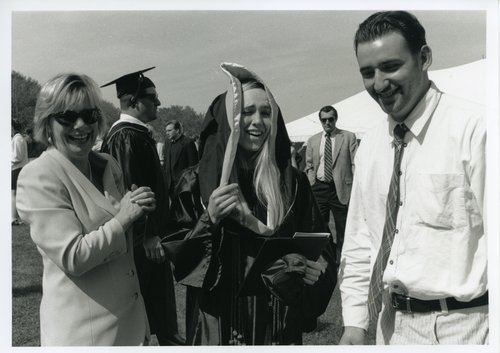
A Class of 1998 graduate clowns with her hood as ceremony attendees laugh.
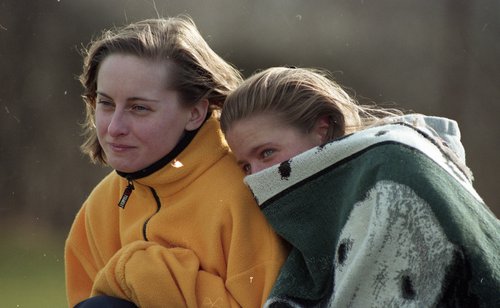
Two Salve Regina baseball fans bundle up and huddle together during a chilly 1999 match against Colby-Sawyer.
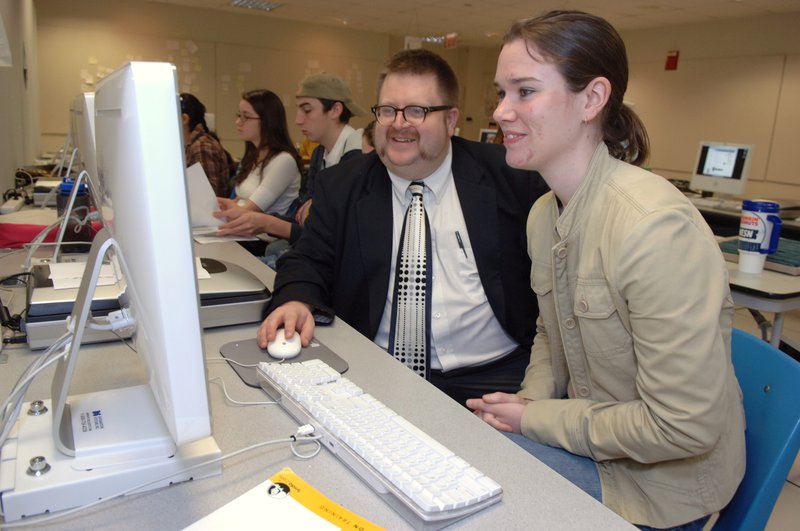
Bert Emerson, associate professor of art and art history, laughs with a student while giving guidance during a 2005 computer design class.
Oral Histories from 1991-2006
Students of Salve Regina: Salve Today 2007-2021
The period of 2007-2022 saw continued growth of the academic program and campus life. In 2008, the renovation of the former Mercy and Wetmore Halls was completed, with the former stables and carriage houses dedicated as the Antone Academic Center in honor of Sister Therese Antone, who served as University president from 1994-2009. The buildings serve as the campus center for the arts.
In 2010, Salve Regina’s Catholic identity and mission was given a new home with the completion of Our Lady of Mercy Chapel, and in 2017, the renovation of O’Hare Academic Building was completed.
In 2019, with the retirement of Sister Jane Gerety, the University entered a new era with the appointment of Salve Regina’s eighth – and first lay – president, Kelli J. Armstrong, Ph.D. While the University changes, some characteristics about Salve Regina students stay the same. They continue to engage politically and volunteer in their communities, strive for academic excellence, pursue justice and seek wisdom, and prepare for the challenge of learning throughout their lives.
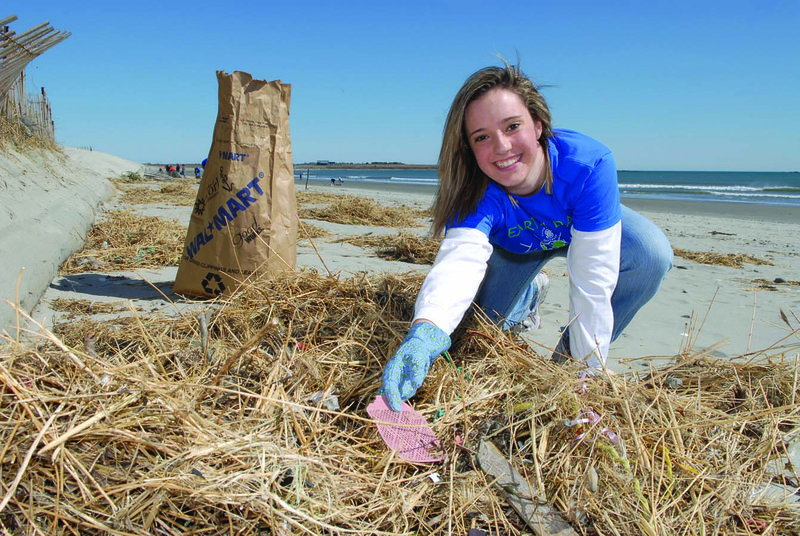
A student participates in a 2007 beach cleanup.
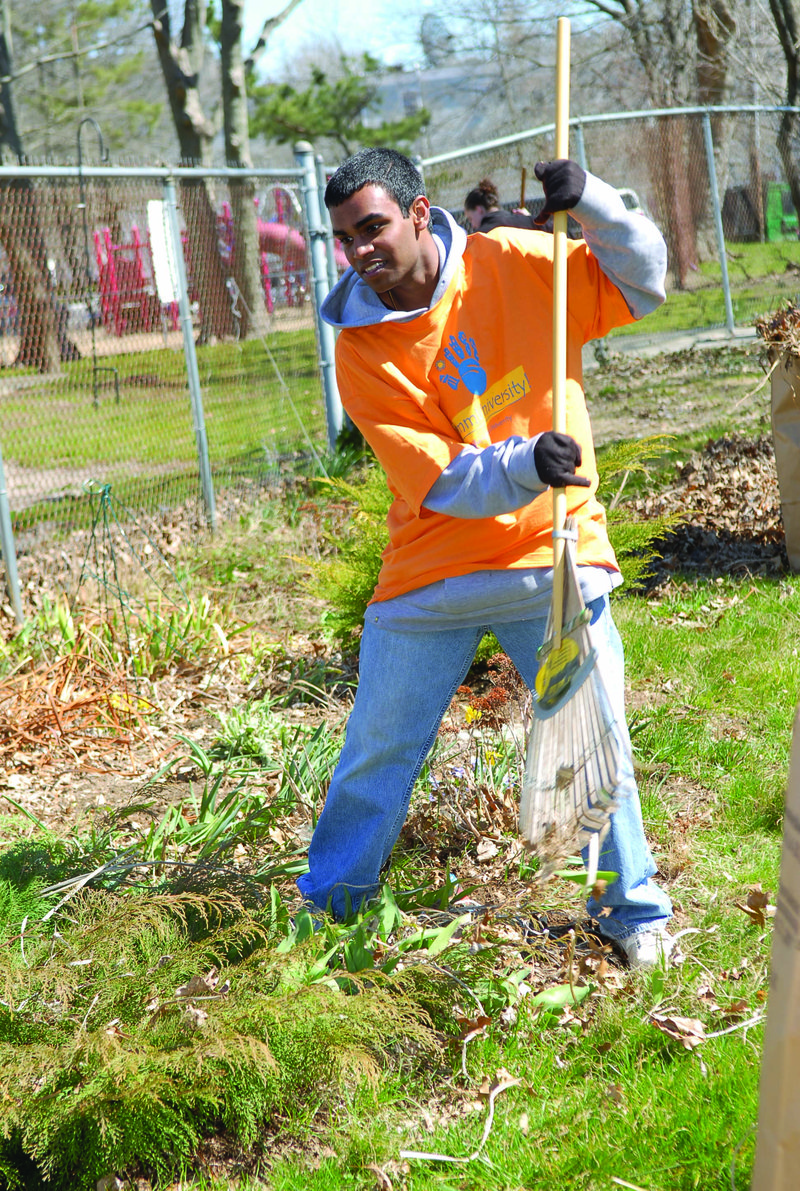
A student rakes during 2007 Earth Day activities.
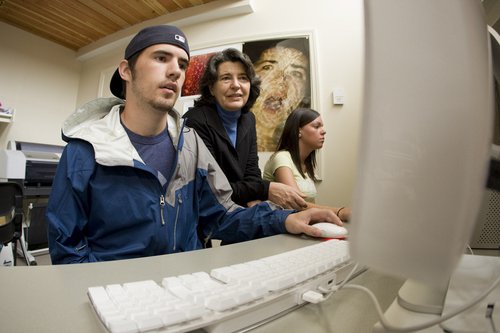
A student and a professor work in the Antone Center Mac Lab in 2008.
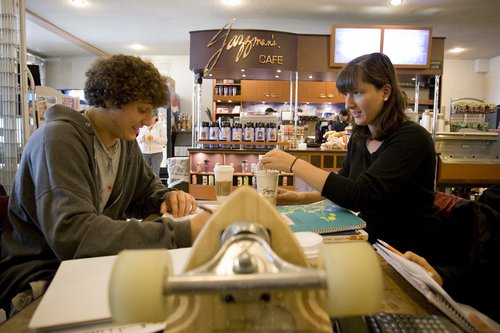
Students study at Jazzman’s café in O’Hare Academic Center in 2008.
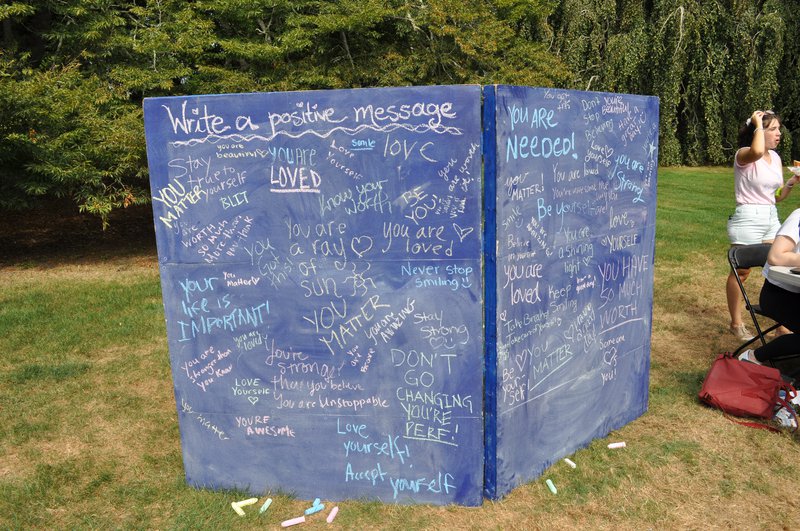
Students offer each other supportive messages in 2009.
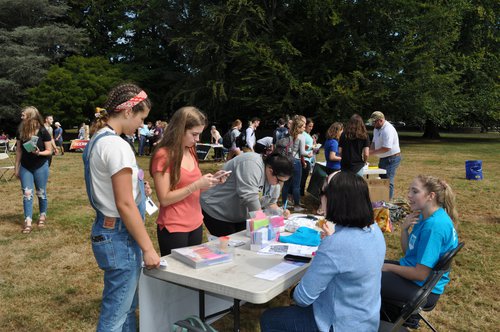
Students circulate among tables at a 2009 Student Activities Fair.
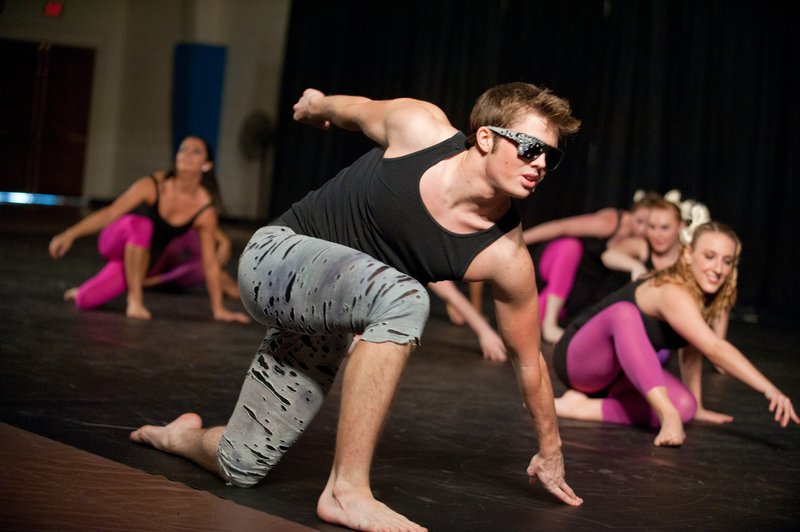
Student dancers perform at a November 2010 dance show.
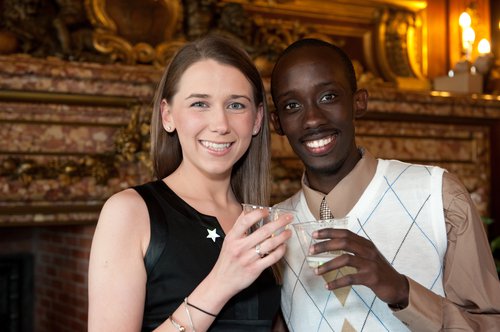
Graduating seniors celebrate at the 2011 Senior Cocktail Party.
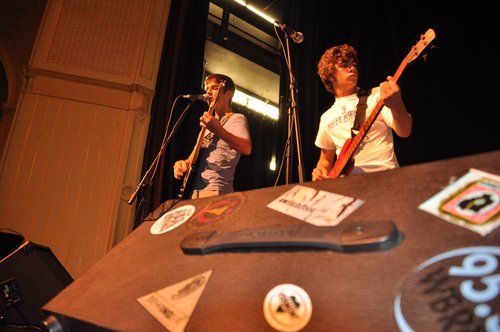
Salve Regina’s Casino Theatre provides the setting for this 2011 student performance.
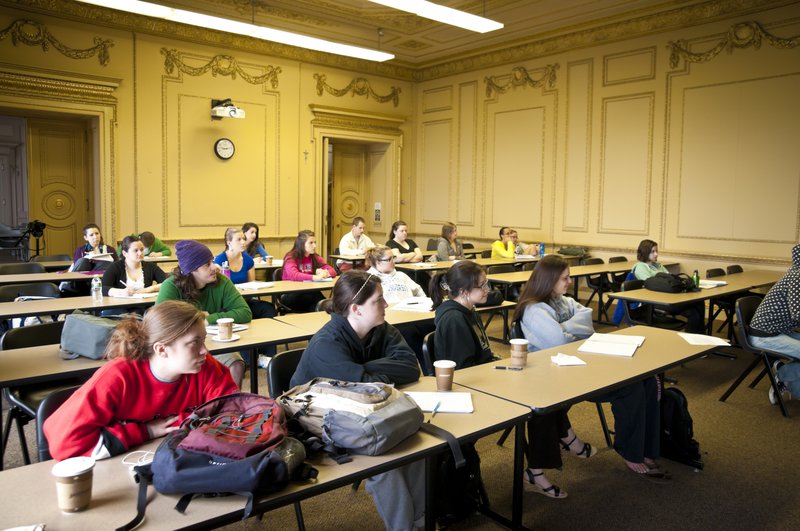
Students pay rapt attention to their professor at class in McAuley Hall in 2011.
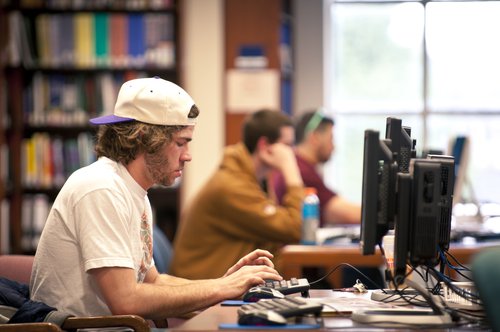
A student types at a McKillop Library computer in 2011.
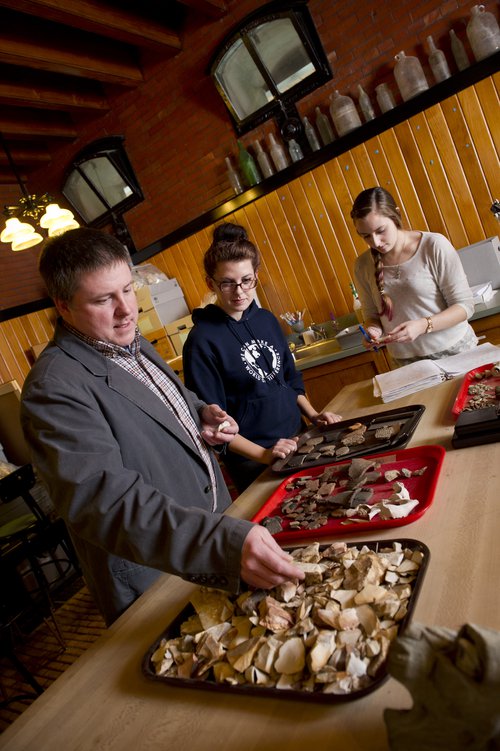
Jon Marcoux, former assistant professor of cultural and historic preservation, trains students to identify pot shards in the Antone Center’s CHP lab in 2014.
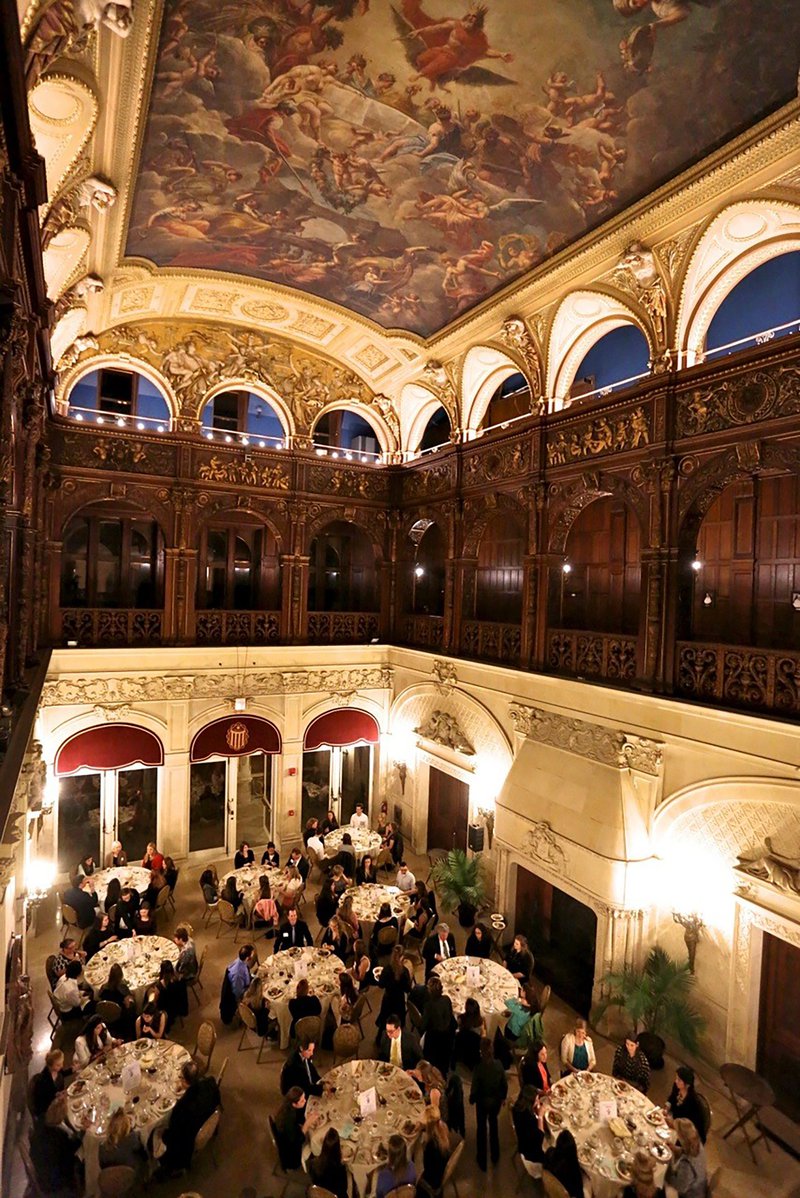
Students participate in the 2015 Etiquette Dinner in Ochre Court.
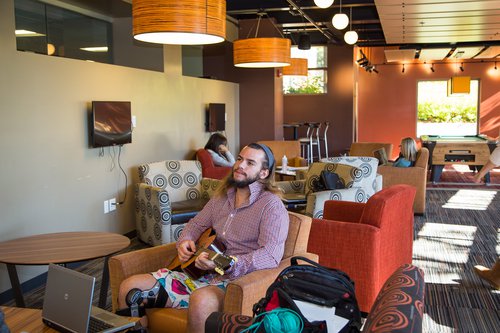
A student plays guitar in the lower level of Miley Hall in 2015.
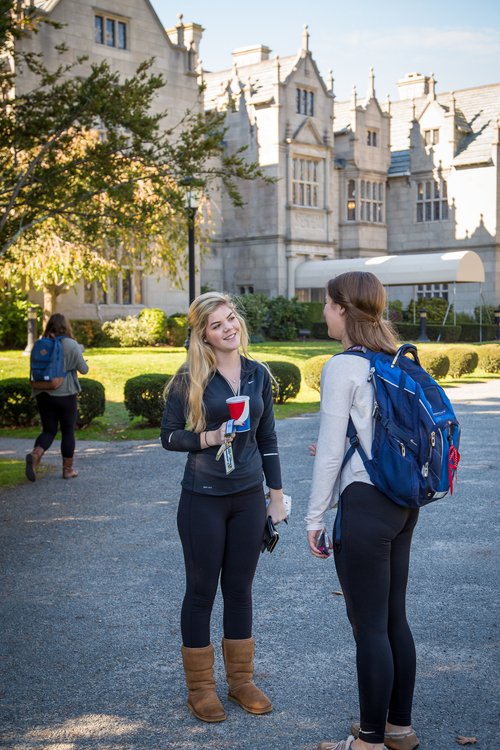
Students visit in between classes in 2015 in front of Wakehurst, now Gerety Hall.
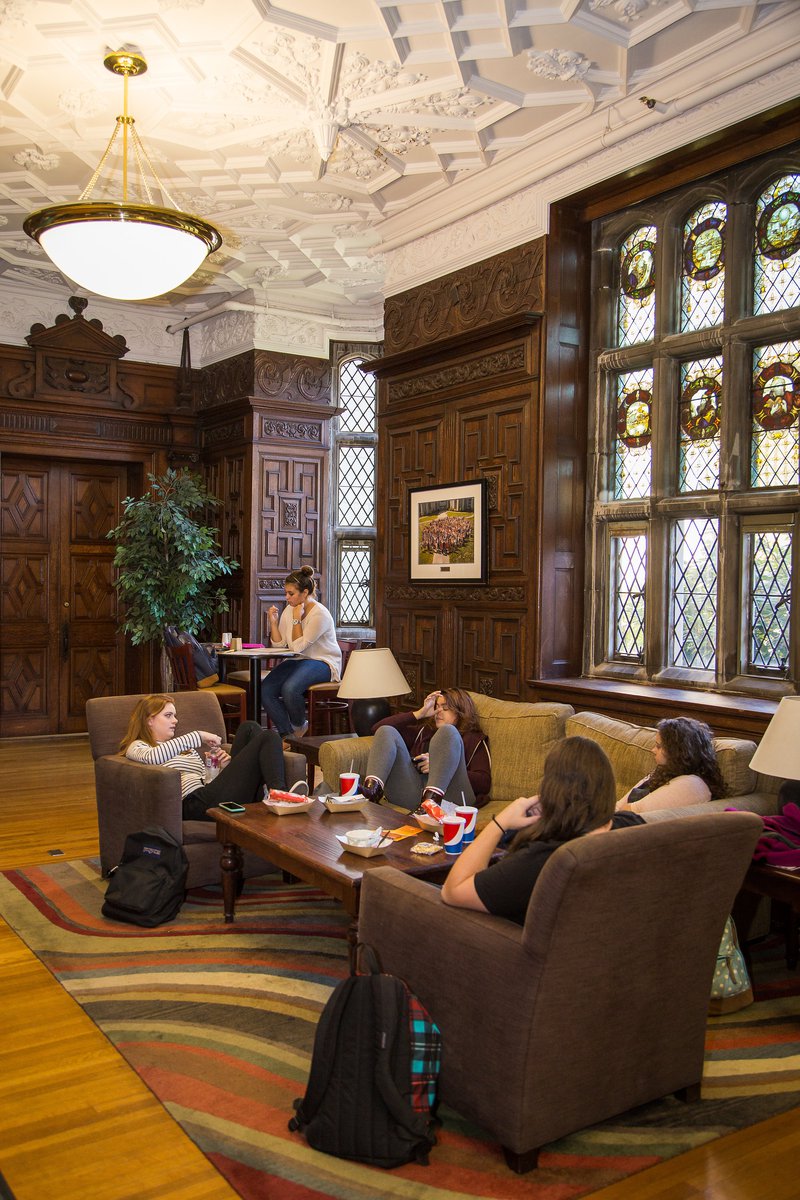
Students relax on couches in the Gerety Hall Lounge in 2015.
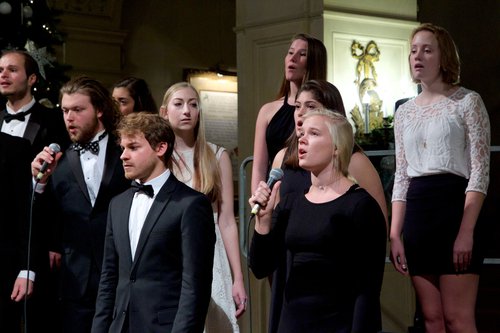
Students perform at a 2016 Christmas choral concert.
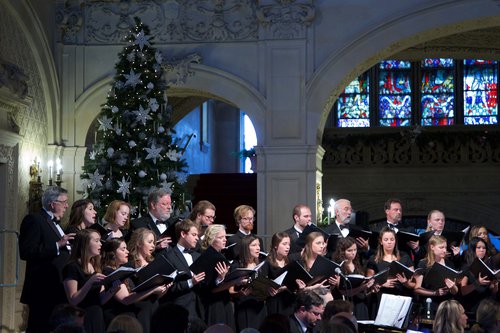
Students, faculty, staff and community members perform at a 2016 Christmas concert.
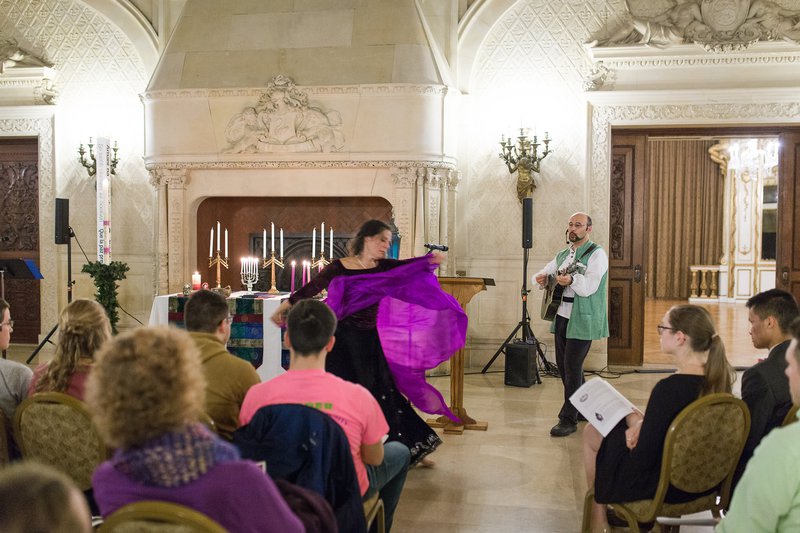
Christopher Carbone, lecturer of counseling, leadership and expressive arts, plays guitar to accompany his partner and adjunct faculty member Katherine Carbone at the November 2016 Festival of Lights.
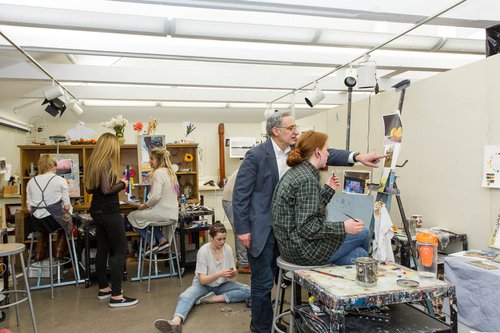
Gerry Perrino, associate professor of art and art history, gives guidance to an art student in April 2017.
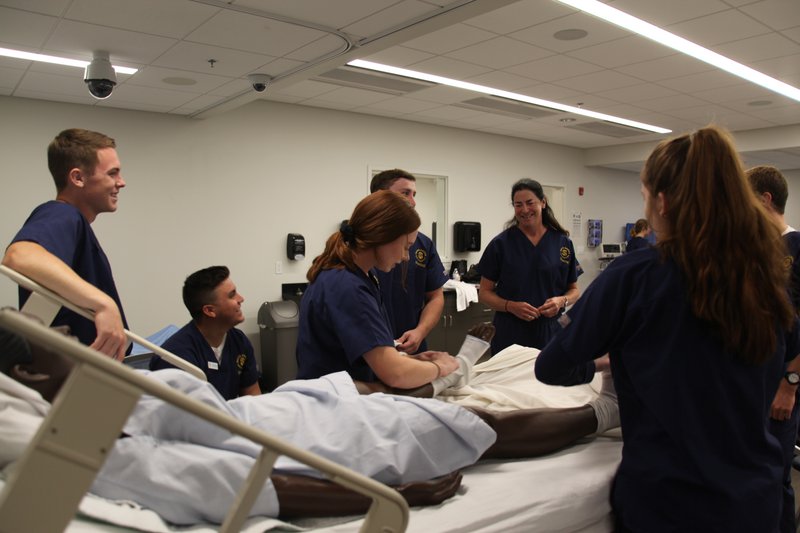
Nursing students participate in a 2018 simulation as Dr. Elizabeth Bloom, associate professor of nursing, looks on.
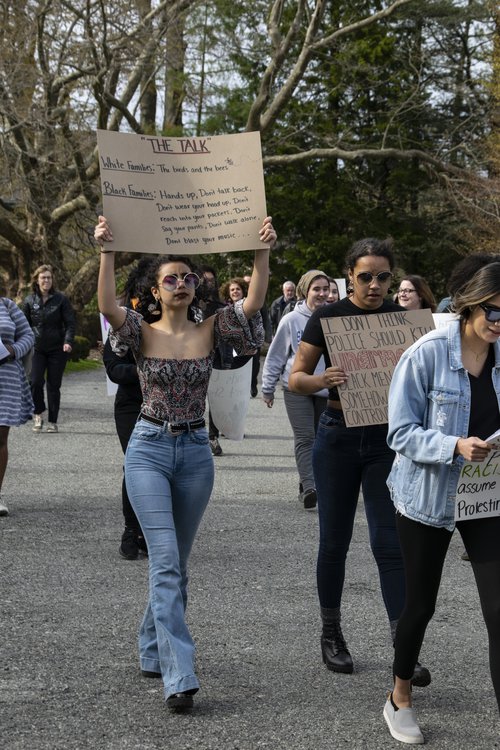
Students march during a 2019 Black Lives Matter protest.
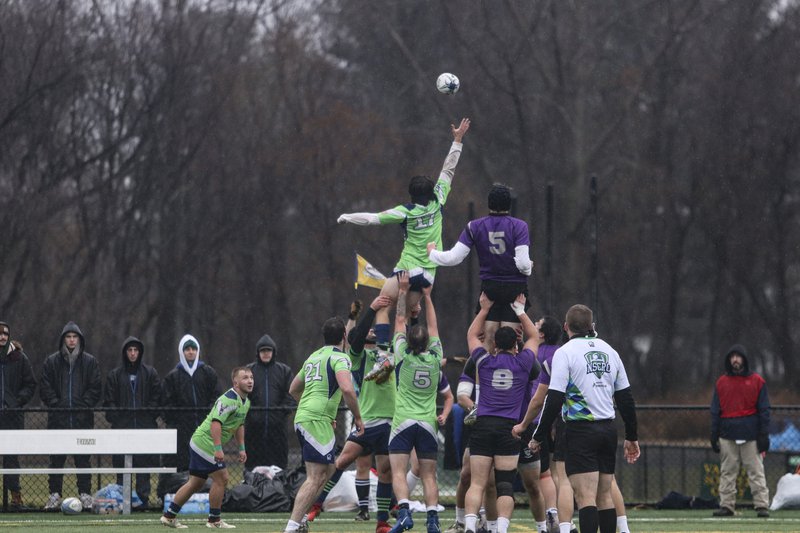
Rugby players give a teammate a boost during a November 2019 game.
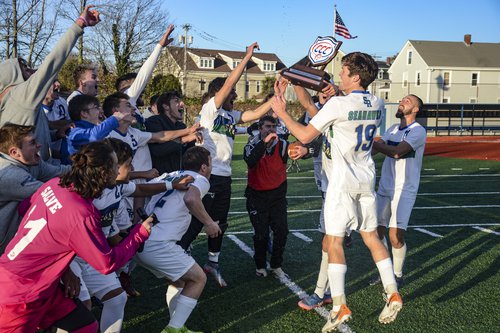
Fans and Salve men's soccer team members celebrate after winning the 2019 championship against Endicott College.
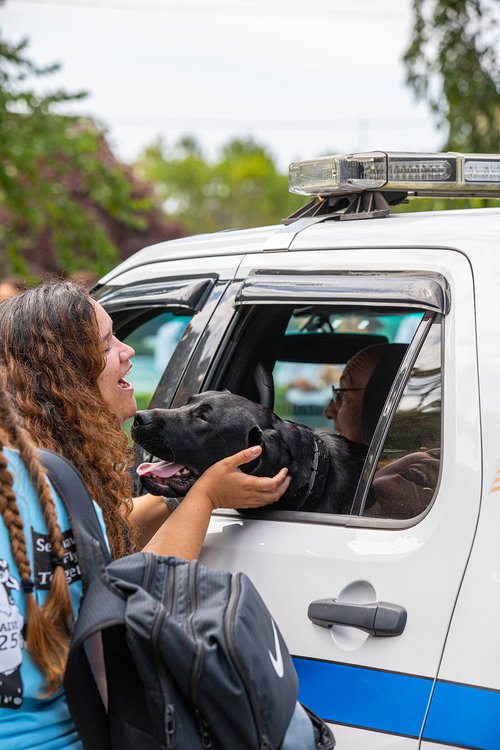
Salve Regina University’s community resource dog, Ruggles, welcomes new students to campus in 2021.
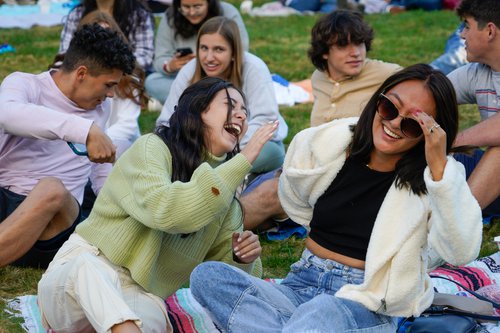
Elise Bautista ’22 and Emma Brown ’22 laugh together while watching the fall 2021 concert on the Gerety Hall lawn.
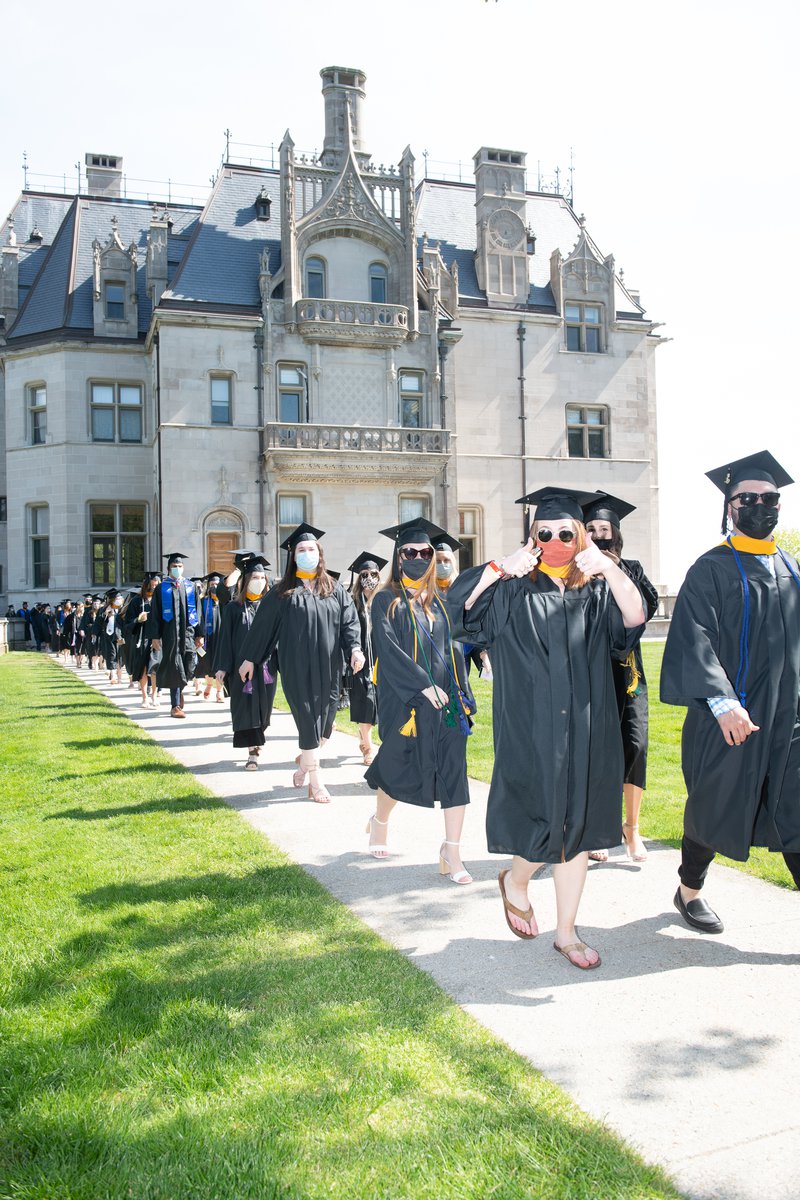
Salve Regina University graduates of the Class of 2021 process, masked, to the commencement tent.
Oral Histories from 2007-2022
